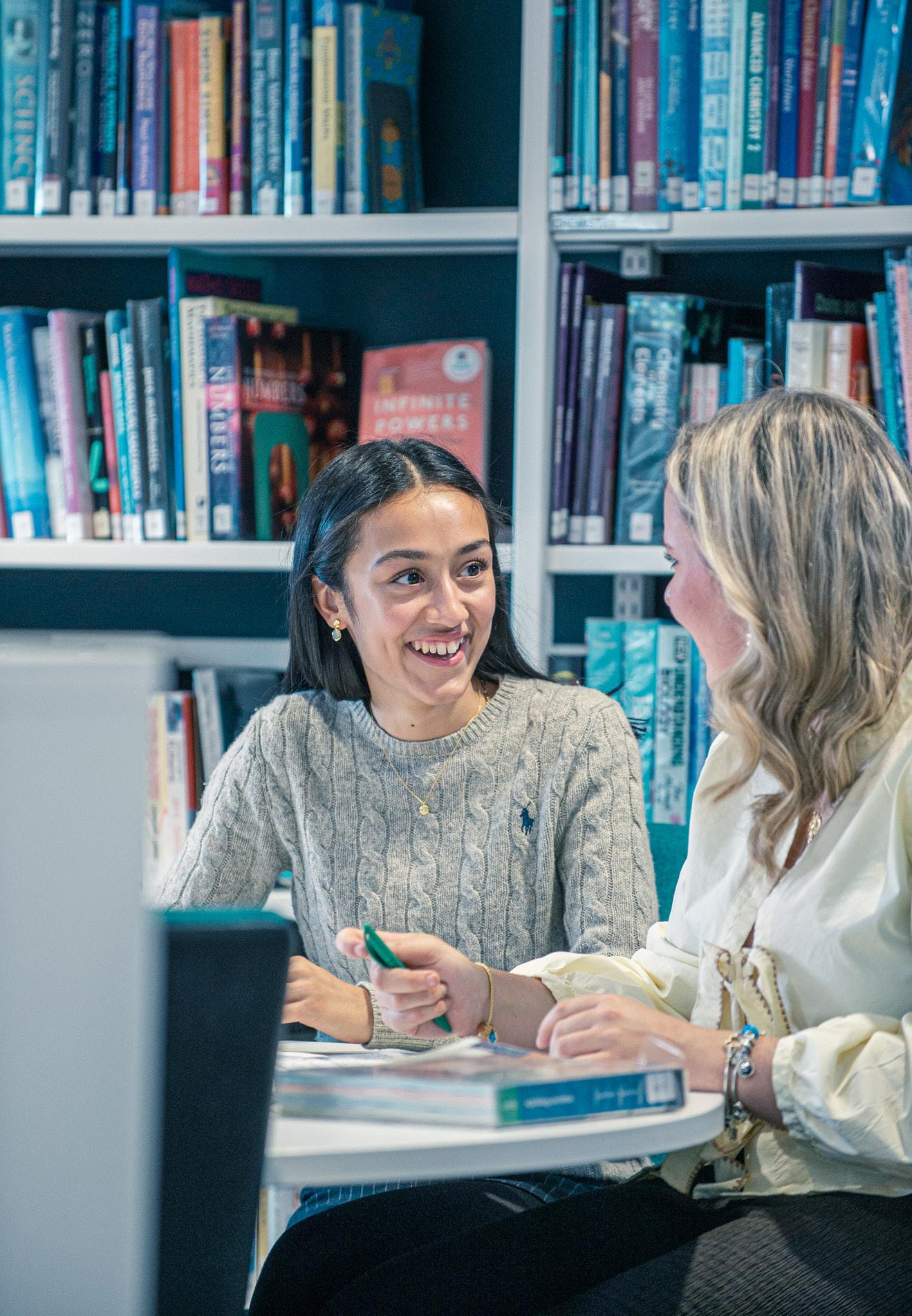
Into Sixth Form 2026 - 2028
Where girls learn without limits




Where girls learn without limits


Studying at NHSG Sixth Form is an important stepping stone to future success, placing you firmly on the road to university or degree level apprenticeships, your future career, and life beyond university in the world of work. Intellectual development, personal growth and a love of learning are at the heart of what we offer at Sixth Form. Sixth Form at NHSG provides the ideal bridge between the final years at school and the world beyond.
Time and time again when we speak with NHSG Sixth Form pupils and alumnae they tell us that the most treasured time of their educational experience was the Sixth Form at NHSG – they say the support they have received from teachers and friends, the inspiring academic journey they have been on as they specialise in their chosen areas of study, the strength of our community, the wide ranging opportunities they were offered and how they have been empowered to reach for their dreams.
Sixth Form at NHSG is an exciting next step. Girls frequently comment on just how different Sixth Form is from earlier years of school, stemming from the greater intellectual freedom and challenge they experience, the greater independence they have and the evolving interactions with teaching staff.
Our academic programme in Sixth Form is shaped by outstanding teaching delivered by inspirational teachers whose aim is for you to achieve the very best you can; teachers who are keen to share their passion for their subjects and encourage you to learn more. Lessons are high energy and pace; they encourage your spirit of enquiry and challenge you intellectually to explore subjects in greater depth. Our superb facilities and smaller class sizes are the perfect combination to enable you to learn without limits, and achieve outstanding A Level results.
Our Life 360 enrichment programme ensures that you are prepared for life beyond university and a huge range of additional opportunities are available to you, both locally and nationally through our membership of the Girls’ Day School Trust, from the GDST Oxbridge preparation weekend to the GDST LEAD programme run in conjunction with the London School of Economics. Our substantial links with universities and businesses serve to expand the range of opportunities even further.
As NHSG’s vision is to empower girls to be leaders, trailblazers and world-shapers, we place high importance on personal as well as intellectual growth. Our superb leadership, enrichment and co-curricular programmes are designed to broaden horizons and develop new skills that will enhance your Sixth Form experience; these will stand you in good stead for the rest of your life. It is through these programmes, and shared experiences with your peers, that you will develop strong friendships and feel a real sense of community here at NHSG.
NHSG Sixth Form is, without doubt, sociable, lively and exciting. Our school is big enough to offer you a huge range of experiences and opportunities but not so big that we don’t know you as an individual. You will be intellectually challenged and stimulated, in a place where you will learn to be increasingly independent and, with expert teaching and guidance, be supported to realise your potential.

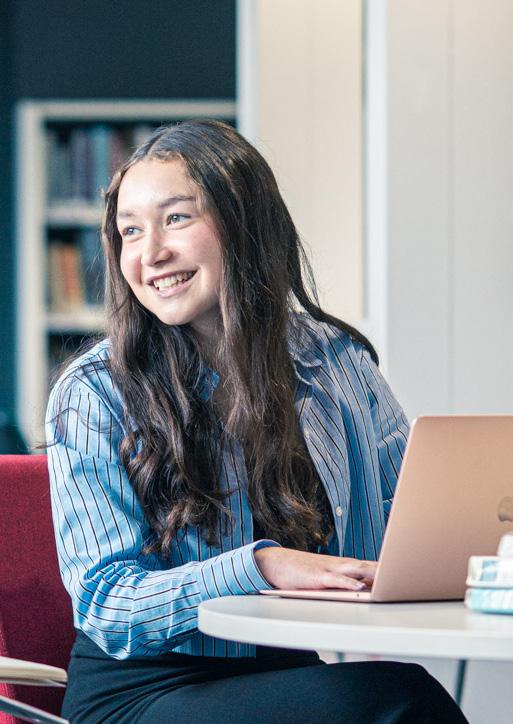
Life in NHSG Sixth Form is different from the rest of the School. You will enjoy more freedom and choice as well as face more challenges. In the Sixth Form you will follow an academic programme which will include your chosen A Levels and study for either the Extended Project Qualification, the Gold Arts Award or a STEM Diploma in conjunction with Northumbria University.
Teaching will be different too. You will have more adult style relationships with your teachers as you move towards adulthood yourself. You will have some of your lessons in our tutorial rooms while also taking advantage of all the excellent facilities at Senior School. You will have first-rate resources and technology on hand and plenty of space for independent and private study, including a library exclusively for Sixth Form use – a firm favourite with Sixth Form pupils. Another exclusive area for Sixth Form pupils is the Sixth Form Common Room, a space where you can relax. The Common Room bistro, Café Six, is open all day, offering nutritious breakfasts and snacks. You can choose to have a café-style lunch here or enjoy a three-course lunch in the main school dining area. You will also embark upon an enrichment programme to extend your knowledge and skills to help you make the most of your time in Sixth Form.
Our aim is to ensure that you achieve the highest possible grades at A Level and to prepare you for university and the world beyond school.
Even PE and co-curricular activities will feel different too as you will have the opportunity to take more of a lead, campaigning for and even running some clubs yourself. Every opportunity we provide contributes to the development of the leadership and collaborative skills that are so highly prized by universities, and employers, while preparing you more broadly for the future. Wednesday afternoon of sport for Year 11 and Sixth Form allows fixtures and opportunities to play against other local schools.
In the Sixth Form you will be treated as a young adult, with all the choice, decision making and responsibility that entails, whilst also knowing that our expert teaching and pastoral team are here to support you throughout your two years.
We want you to immerse yourself in Sixth Form life, take full advantage of the opportunities open to you and play your part as a member of the community that is Newcastle High School for Girls.

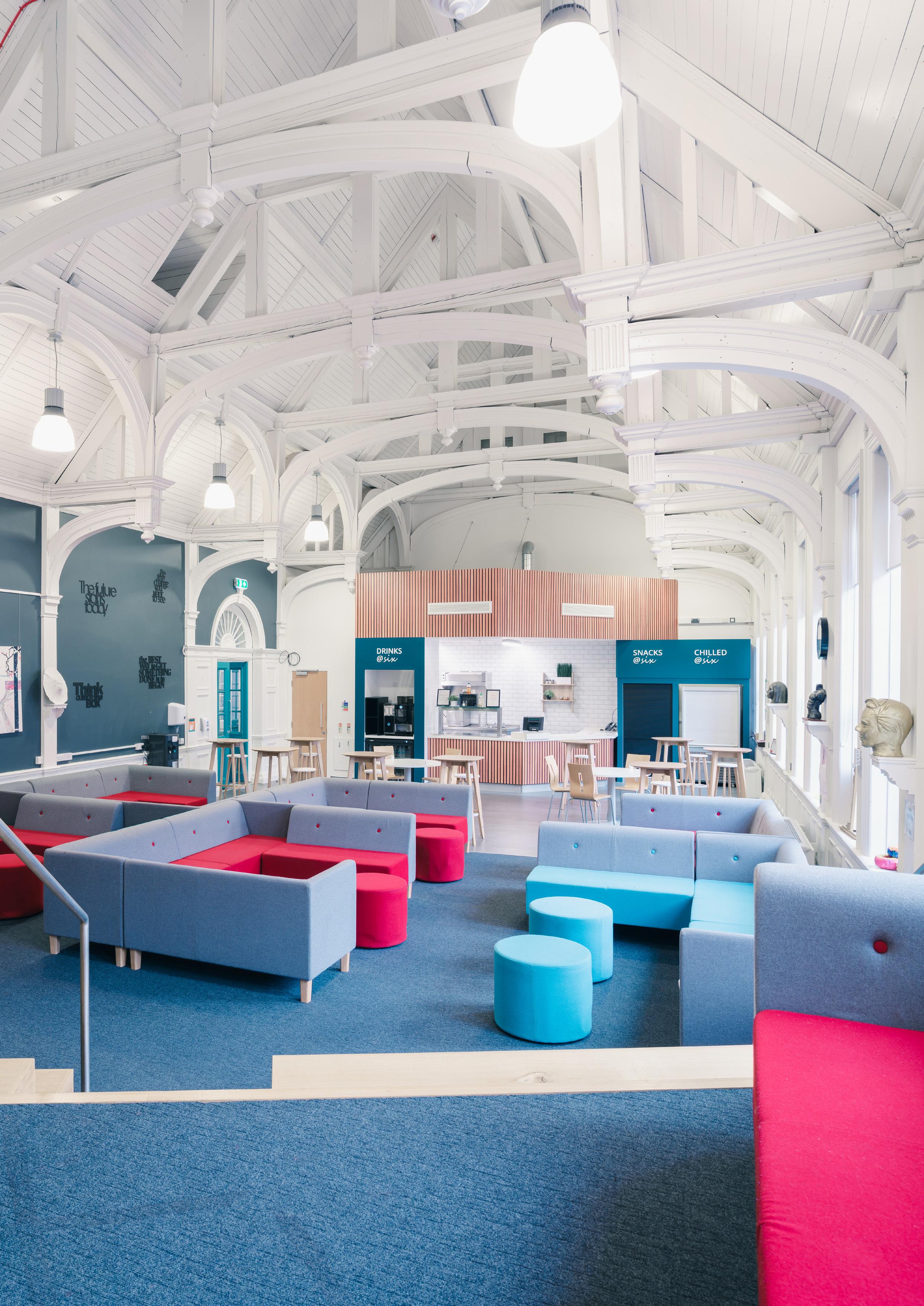
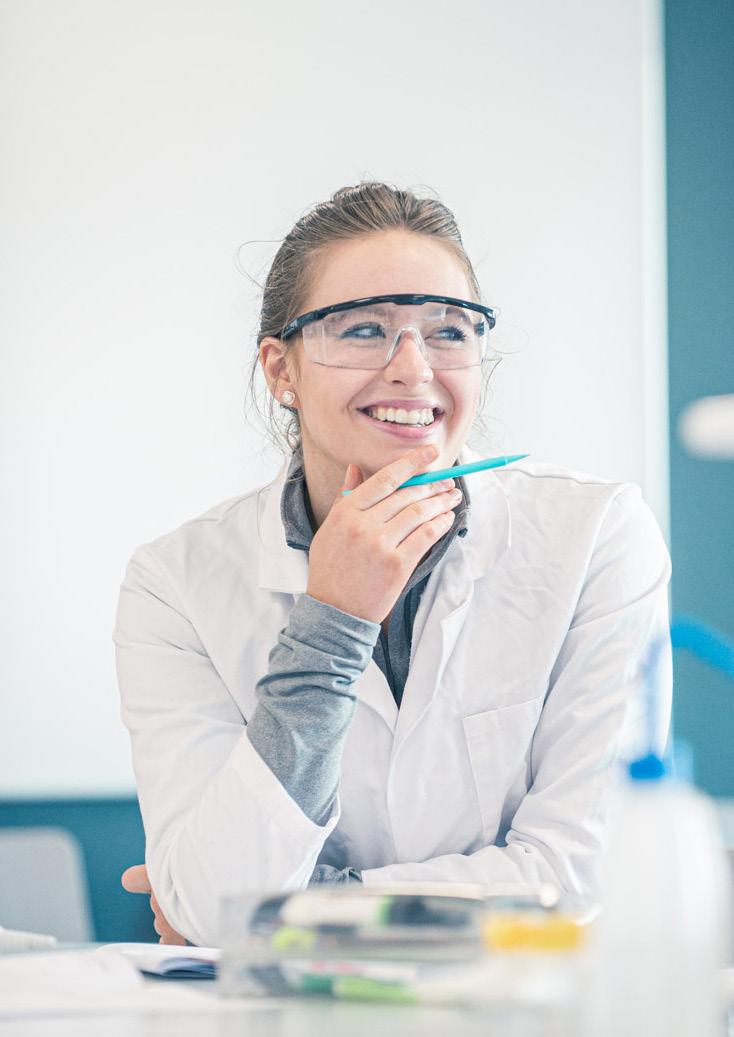

At NHSG, no-one needs to follow the pack or feel they need to fit a mould. Every girl is unique and has her own special characteristics, and has interests she is passionate about. You may already know what future pathway you want to follow, or you may be among the many who are still figuring it out. Indeed, you may think you know your direction but then end up changing your mind once in Sixth Form. All of this is absolutely how it should be at this stage when there is still so much to learn and explore.
One size doesn’t fit all in life, nor does it at NHSG. We want you to blaze your own trail and be the person you want to be.
It is for these reasons we offer such a wide range of opportunities, and at NHSG you will be on a journey of discovery during your Sixth Form years.
And it is in an All Girl environment at NHSG Sixth Form where this journey of discovery can take flight. Here, you will be able to challenge yourself to take risks intellectually and practically. You will be able speak up and be heard in and out of the classroom. Your decisions will not be influenced by conscious or unconscious gender bias, and you will be able to take a leading role in your studies and wider Sixth Form life.
Most of all, you will be empowered to be unapologetically confident; to stand up for, and defend, your values and beliefs.
In fact, a major new survey, The Girls’ Futures Report, from the Girls’ Day School Trust (GDST), confirms just how much NHSG, as a GDST school, can impact on your life now and in the future.
The GDST’s report is based on the responses from a nationally-representative sample of girls from GDST and non-GDST single-sex and co-educational schools. The responses from GDST pupils demonstrate the strengths they draw from the care, passion and expertise to be found in GDST classrooms: their resilience, their desire for leadership and their confidence in speaking out.
NHSG girls are more self-assured, more politically aware, more empowered, better able to pursue their ambitions, and feel unhindered by their gender. NHSG girls develop confidence early and feel more positive about their futures than girls of their own age nationally. They are also more willing to embrace flexible careers, take less traditional routes and risk change than girls who go to non-GDST schools.
Together, this means that girls-only schools, and in particular GDST schools, are the best at preparing girls for the future.
Women continue to be paid less and to take up fewer leadership roles –that needs to change and we will empower you to be part of the solution.
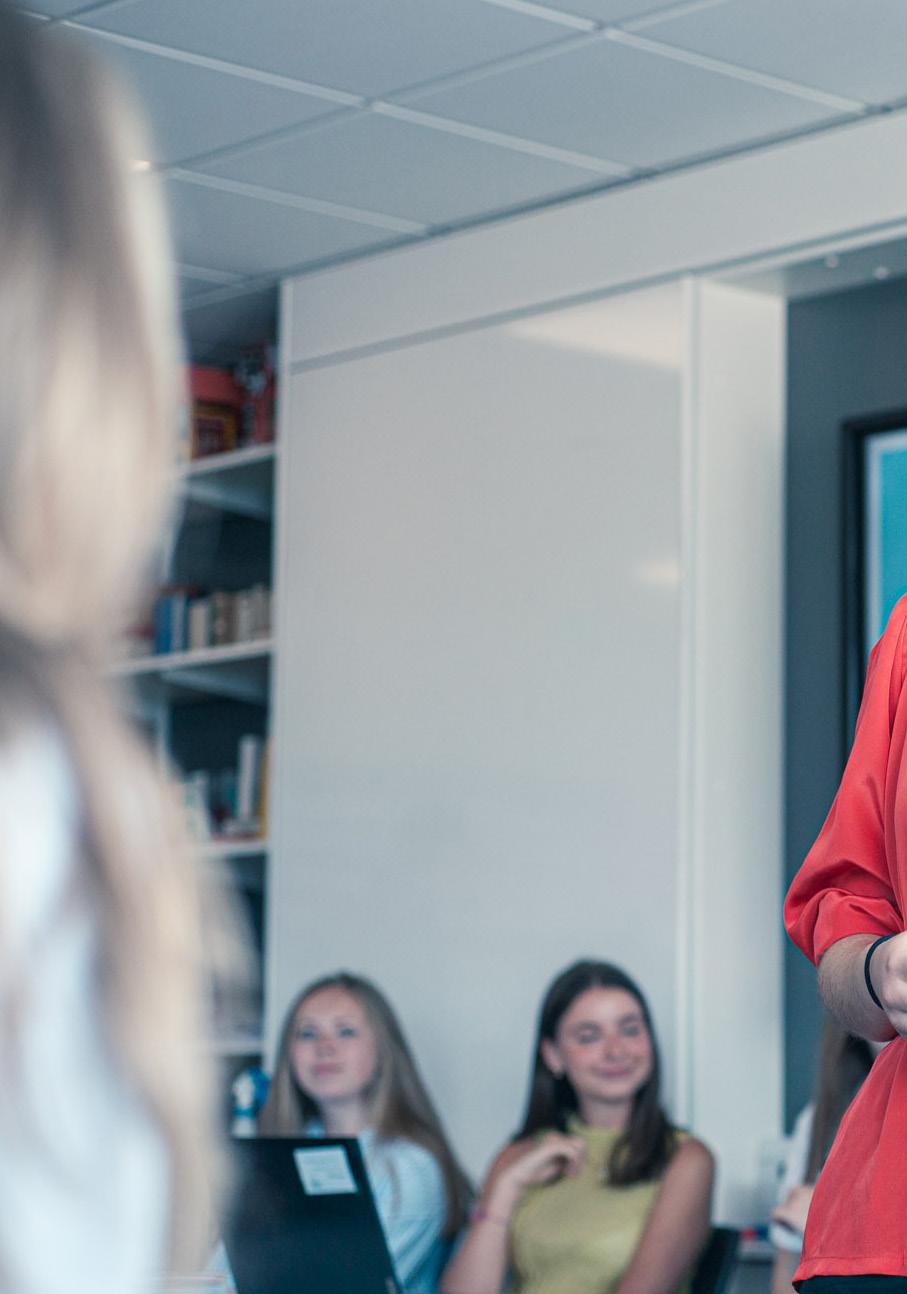
We believe leadership skills are critical, and we will encourage you to take a lead in some aspects of your Sixth Form life. This might involve taking the lead on a project in the classroom, getting involved in supporting younger pupils in school, running a club or presenting an assembly. Our Sixth Form Leadership Team, including the Head Girl Team and House Captains, alongside our Sports Captains, Drama Captains, Dance Captains, Music Captains and Art Captains, play a vital role in being a voice for the pupil community and in running activities.
As part of our Enrichment Programme, and working with the London School of Economics (LSE), you can also embark on the GDST Leadership and Enterprise Advanced Diploma, a unique qualification that is designed to allow young women to develop the skills to be future leaders and entrepreneurs. You also have the option to take our STEM Diploma supported by Northumbria University in which you will investigate and report on the impact of AI and how it can be used in the future by industry.
Alongside this, our ‘See it to be it’ and ‘Trailblazing in...’ assembly programme ensures that you will hear from a range of inspirational women who have carved a successful career in their chosen field, many of whom are alumna of NHSG and once sat where you are sitting now. They will share with you the path they took, talk openly and frankly about the challenges they faced and inspire you with their individual story of leadership success.
Your potential is limitless, and we pride ourselves on encouraging all girls to be the very best versions of themselves. We hope that through providing you with academic rigour and varied opportunities, you will develop into a rounded and enthused learner who not only possesses qualities sought after by universities and employers but also makes a positive contribution to society.
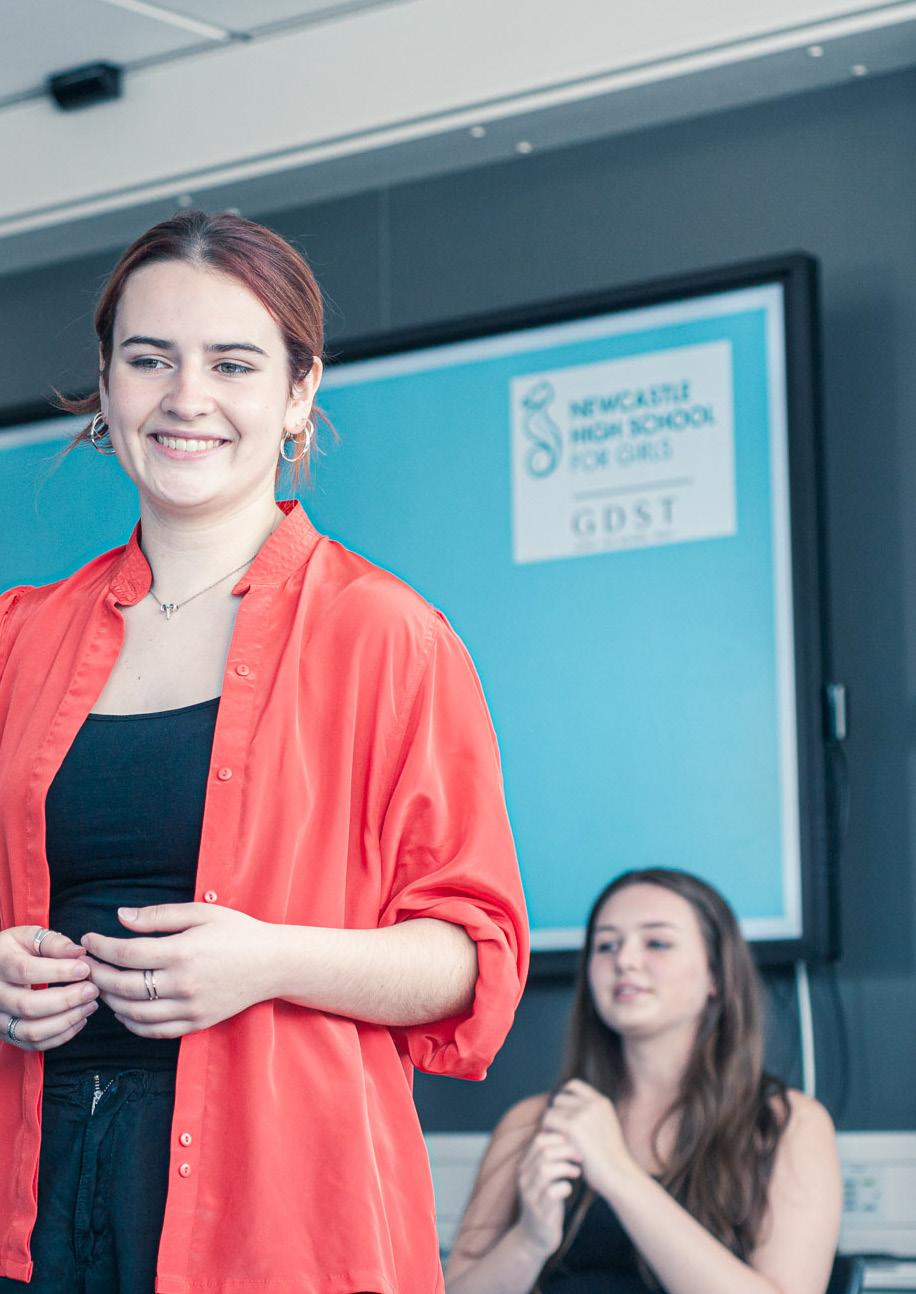
Our enrichment programme opens up a world of new experiences and will allow you to engage with people and places and learn something that goes beyond your chosen A Level courses. This programme which runs across the two years of Sixth Form will enrich you as an individual and enhance your understanding of the world around you.
Life 360 is an enrichment programme to provide Sixth Form girls with a holistic suite of learning activities that will empower you to make the most of the opportunities life brings your way. This programme covers financial literacy, political understanding, citizenship and social responsibility. You will consider the makeup of the United Kingdom and the impact of Brexit, how the parliamentary system works, including local and general elections, your role within society and how you can make a positive difference locally, nationally and globally. The course also includes a key understanding of the financial systems in the UK and the responsibilities and opportunities they bring, such as pensions, the taxation system, mortgages and investments. Life 360 is part of our future facing approach to education which runs through everything we do, ensuring that we empower you to be the very best version of you in every sense – not just in terms of academic success.
Every girl is encouraged to volunteer in the local community in some way; perhaps by working with children, disabled people or the elderly. Sixth Form girls are involved in a wide range of volunteering opportunities including working on the Science is my Superpower STEM scheme, leading sporting activities through our in-house sports leadership programme, going to a local primary school to listen to young readers, taking a Junior School club or helping out at a local care home. This will enable you to have a wider understanding of the world and the impact that being a good citizen can have on others.

Through the CEF Programme, you will hear from a variety of speakers on topics relevant to Careers, Employability and your Future. Recent lectures have included transferrable skills from the London School of Economics, choosing courses from Sheffield University and 21st century recruitment from GDST. In addition, we invite NHSG alumnae to School to speak about their career journey and promote potential future opportunities.
Personal, Social and Health Education lessons provide you with guidance in a variety of areas such as managing stress, how to stay safe and developing a healthy lifestyle. In addition, you will meet with your Form Tutor every term to discuss your progress and Personal Development Plan. These meetings are designed to support you in reaching your goals.
“Physical fitness is not only one of the most important keys to a healthy body, it is the basis of dynamic and creative intellectual activity.” John Fitzgerald Kennedy. With these fitting words in mind, PE is compulsory in Sixth Form. It is our hope that you can find an activity that you enjoy and will therefore continue into adulthood. We offer a range of activities and there is also the opportunity to use our stateof-the-art fitness suite. The programme we offer will reflect the interests of the girls involved. Participation is key to a healthy lifestyle and making sure you enjoy the sessions and therefore want to do more is our ultimate goal. Our weekly Wednesday afternoon of sport for Year 11 and

Sixth Form allows more fixtures and opportunities to play against other local schools.
GDST Leadership, Enterprise Advanced Diploma (LEAD) and Language Ambassadors
You will have the option to follow the GDST LEAD and Language Ambassadors programme to enhance and develop your leadership skills. You don’t have to be studying Business or a language at A Level to participate. GDST LEAD is designed to develop the skills you need to be a future leader and entrepreneur and you will be working with students across the GDST to gain a diploma endorsed by the London School of Economics.
The STEM Diploma has been designed and developed in conjunction with Northumbria University and industry leads. The nature of this diploma is to allow you to investigate and report on the impacts of AI and how it could be used in the future by industries.
There are taught elements of the diploma which are delivered by NHSG and the University, as well as an opportunity to liaise with industry leads such as Sage and Catapult to allow you to appreciate the theory in practice.
This diploma will culminate in either a written report or documentary style video and panel presentation to the University and industry representatives to relay your research findings and recommendations.
There are many trips and visits organised for the girls in Sixth Form both in this country and abroad. The following is simply a selection of the brilliant opportunities on offer. Those taking Modern Languages can enjoy travel to France, Germany and Spain where they are encouraged to carry out work placements in the host language. Girls taking Biology benefit from a residential field trip to the Cranedale Centre in Yorkshire.
The Art, Dance and Drama departments offer trips to theatres, museums and exhibitions locally and in London and have previously visited New York. There have been Politics trips to visit the Houses of Parliament in London and also to the USA. The History department provide the opportunity to visit Berlin where pupils spend time exploring the city’s fascinating history and rich history. The Sports staff arrange a biennial sports tour. Locations for previous tours have included South Africa, Australia and Sri Lanka.
There are also regular ski trips and numerous excursions to Regional and National sporting competitions, where girls may compete against sister GDST schools in a wide range of sports. Furthermore, you will be invited to attend lectures, workshops and other events of interest in order to consolidate and extend your learning as well as to help you to develop a real passion for your chosen subjects.
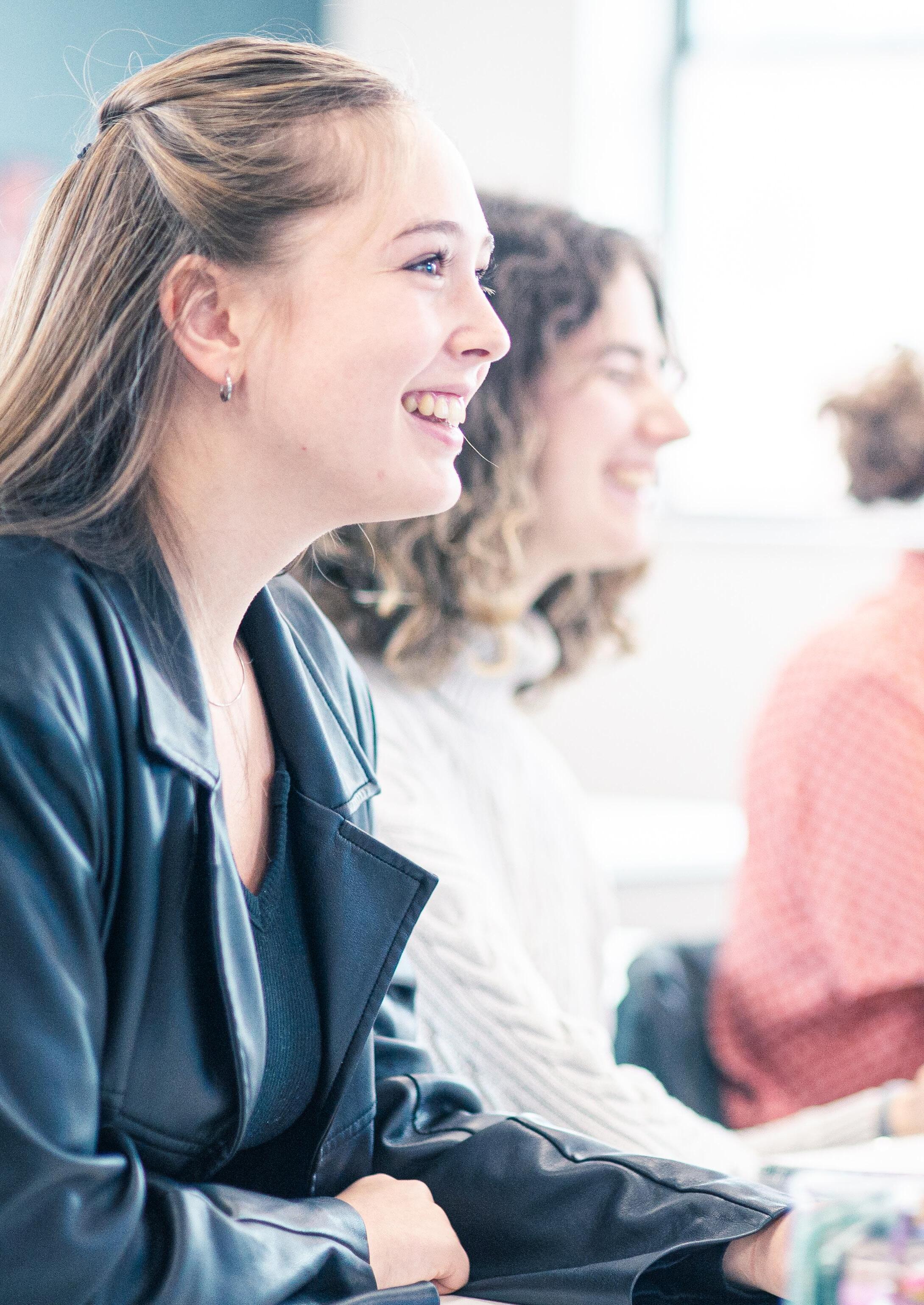

Whatever you want to study, we will prepare you well for the future. Almost all girls go on to university or Art, Dance, Drama and Music Schools. Every year we have a significant number of girls achieving places at Russell Group institutions in a vast range of subject areas. We also have a number of girls who are successful in applying for highly competitive degree apprenticeships.
At NHSG we have a dedicated Head of Careers, Mrs Ridley, who works closely with our teaching team and with you to help you make the right choice of career path and higher education institution.
Understanding your options
As well as the CEF programme referenced on page 12, we will invite a variety of speakers to School to tell you more about their careers and to offer you advice as you begin to focus on your choices for higher education and beyond. Our ‘Trailblazer In...’ assembly series introduces you to successful women, many of them alumnae of NHSG, who will tell you more about their own career path and opportunities. This is further supplemented by our dedicated Careers channel on Teams, which lists a whole host of programmes, webinars, and work experience opportunities from major organisations in the UK and sometimes abroad.
Making your university application
Not only do you receive superb access to career-based opportunities, you will also receive outstanding support in choosing the right higher education courses for you including opportunities to study abroad. You will be provided with an account for Unifrog which describes itself as ‘The universal destinations platform’. This excellent tool allows you to compare every university course, every
apprenticeship, and to make a successful application. To help you make the right choice, we have a substantial programme of activities and support.
If you would like to apply to Oxbridge we provide specific in school support and practice interviews. We also recommend you attend the GDST Oxbridge Conference where GDST take over an Oxbridge College for a weekend and immerse potential applicants in university life, as well as specialist Oxbridge practice interviews.
If you would like to pursue Medicine, Dentistry and Veterinary Science, we provide specialist support and opportunities to practise interview technique.
Whatever route you choose, you will be assigned a personal tutor to help you with your application and Personal Statement and the Head of Sixth Form and Head will meet with you to discuss your application to ensure it is the best that it can be.
The GDST Difference means we offer you more Another of the significant benefits of being part of the Girls’ Day School Trust is the number of special scholarships and awards which you can apply for. These are unique to the GDST and include:
• GDST Travel Scholarships
• GDST Creative Writing Prize
• Johnston Memorial Scholarship for Law
• Minerva Prize for all-round achievement
• Pearson & Silver Awards for financial assistance in attending courses or meetings with a classical content
• Frederica Lord University Scholarship and Lorna Cocking Scholarship
• Laurie Magnus Poetry Prize
• Somerville and Gurney Awards
GDST Alumnae Network
Even when the Sixth Form years are over, results received and university places accepted, we will continue to help. All girls join the unique GDST Alumnae Network – a powerful and supportive group of over 75,000 women offering a gateway to professional and social coaching, mentoring and networking opportunities. You don’t need to wait to become an alumna to benefit from the network. When you join the Sixth Form at NHSG you automatically become a member of the GDST Alumnae Network and can take full advantage of everything it offers.
In addition to the careers support you receive from staff in school, the GDST Alumnae Network can also put you in touch with people in all kinds of jobs, who can tell you about their own experiences and the routes they took to get there. You can also apply for work experience with GDST alumnae who are happy to help. In addition, we have close links with a number of major employers with whom GDST arrange special events. We can provide advice, examples, opinions, opportunities for personal experience – everything you need to help choose the career path that is right for you.

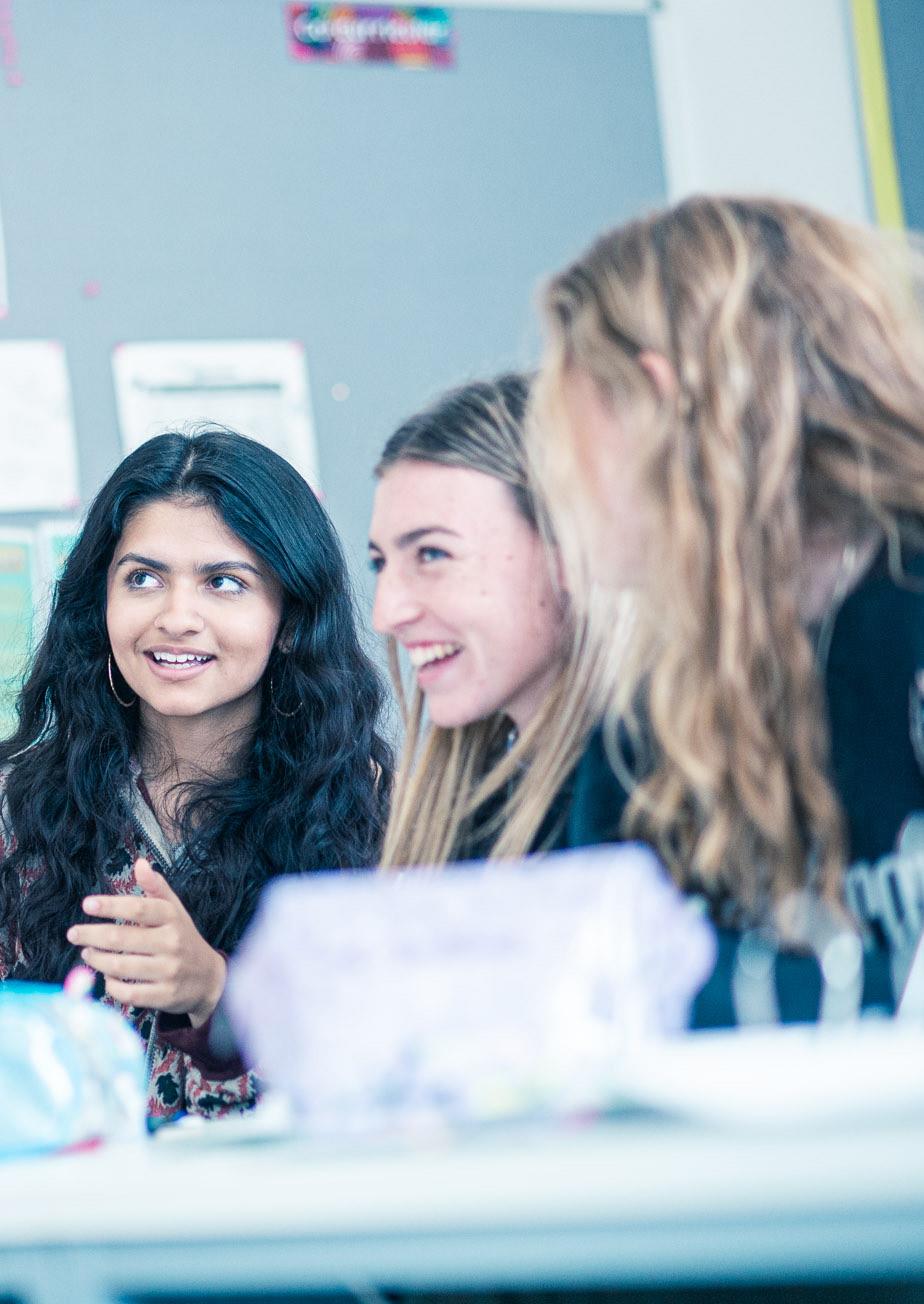
Our Academic Programme is designed to allow you to pursue the subjects you love, to develop and acquire new skills and prepare you for university and beyond.

You will:
• Study three A Level subjects – see course options on page 20
• Have the option of Further Maths as a fourth A Level choice
• Undertake an Extended Project Qualification, Arts Award or STEM diploma.
• Take part in a full enrichment programme.
The Extended Project Qualification (EPQ) assesses your ability to carry out research and work independently. It enables you to step outside the confines of your A Level courses and work on something in which you are passionately interested. You have 120 hours to complete a project on a topic of your choice. An important aspect of EPQ is the taught element. All girls in Year 12 attend three lessons every fortnight on study skills, incorporating independent learning, research, academic writing and presentation skills. This programme promotes invaluable skills that are highly sought by universities and employers. When you undertake an EPQ, you will then build on these skills to conduct your own research and produce an artefact or a 5,000 word project.
You will be assessed on the project, a presentation given to your peers, teachers and invited guests, and a log that you create to outline the different stages of your research journey. It is important to understand that, although a member of staff will be your supervisor, all work must be your own and the responsibility for keeping on track is yours alone. The EPQ is demanding but rewarding. Recent titles have included:
• An evaluation into the methodological efficacy of forensic odontology in personal identification.
• Should all children undergo genetic testing when they are born to check for genetically identifiable types of Ehlers Danlos Syndrome?
• AI and the Art Industry: How can we utilise it, and what are the barriers?
• To what extent is the colonial past of Nigeria responsible for the changes in tribal scarification in the Yoruba tribe over the last one hundred years?
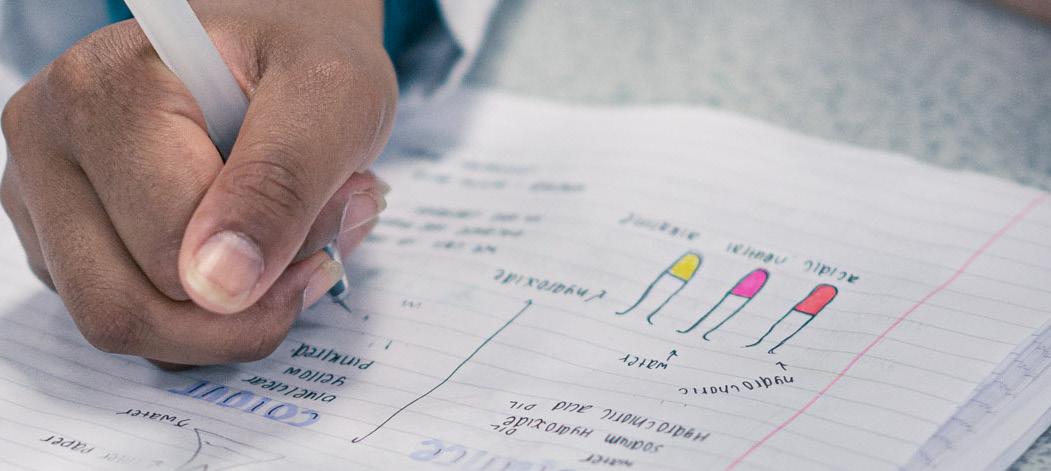
The Gold Arts Award is a Level 3 qualification in Arts and is the highest recognition of your abilities as a creative arts leader.
At Gold level, you are working as an arts practitioner while broadening your horizons within the arts world. Working at this level will extend your creativity, communication, planning, teamwork and leadership skills, and will support your progression through any education, training or career pathway.
Unit 1 – Personal Arts Development
Unit 2 – Arts Projects Leadership
During contact time with your teacher you will plan your work and keep a record by creating your own Arts Award portfolio. You can pick your own style of portfolio – this could be a diary, video, website blog – or something different.
The STEM Diploma has been designed and developed in conjunction with Northumbria University and industry leads. The nature of this diploma is to allow you to investigate and report on the impacts of AI and how it could be used in the future by industries.
There are taught elements of the diploma which are delivered by NHSG and the University, as well as an opportunity to liaise with industry leads such as Sage and Catapult to allow you to appreciate the theory in practice.
This diploma will culminate in either a written report or documentary style video and panel presentation to the University and industry representatives to relay your research findings and recommendations.
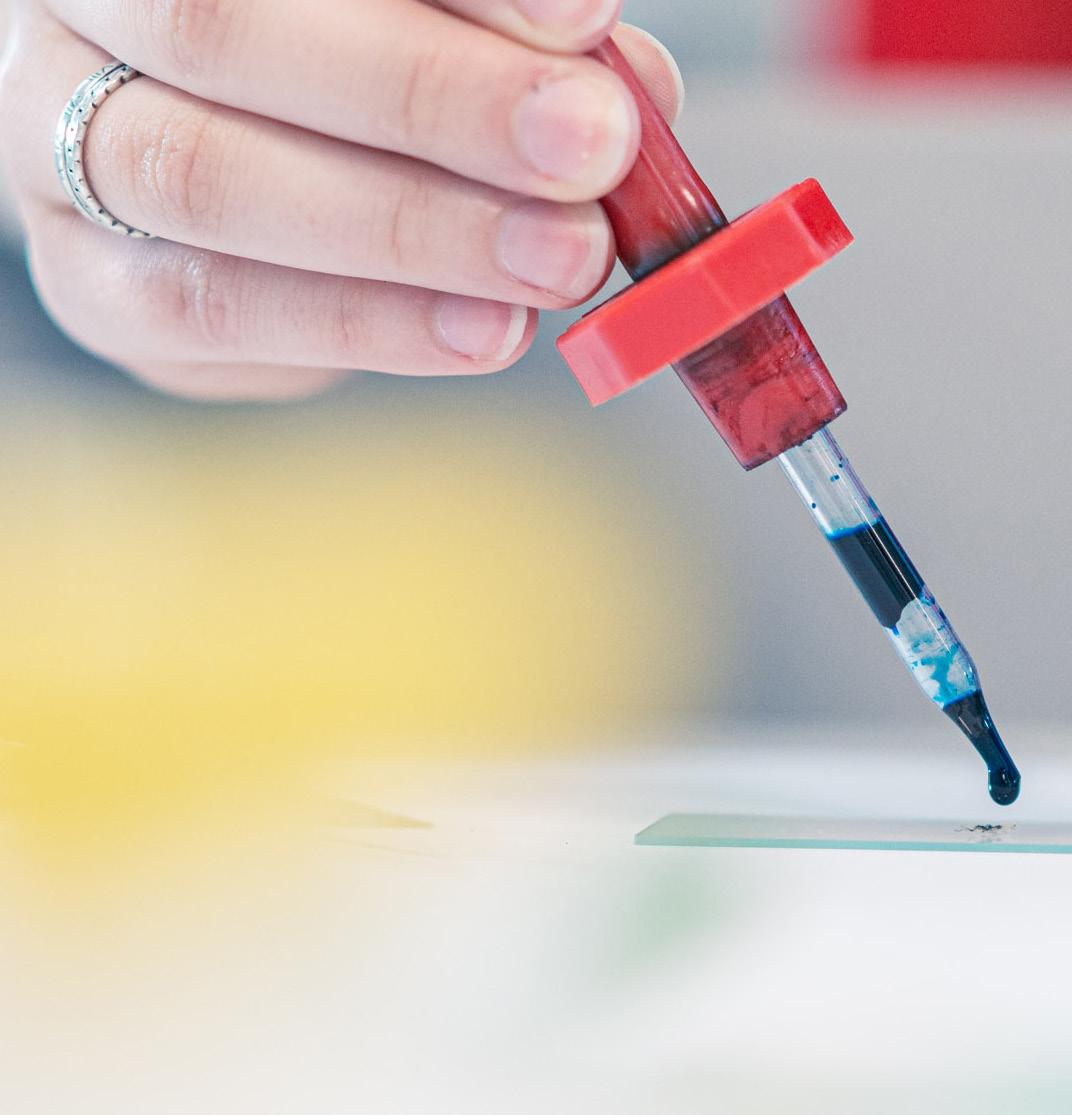
Subject
If you would like to discuss your subject choices you are welcome to contact any of the staff listed below.
The table below outlines the subjects we offer at A Level.*
Head of Department
h.harrison@ncl.gdst.net
Art: Fine Art; Graphic Communication; Miss A Goldie a.goldie@ncl.gdst.net
Textile Design
Biology
Business
Chemistry
Classical Civilisation
Latin
Computer Science
Dance
Drama and Theatre
Economics
English Literature
Food Science and Nutrition
French
Geography
German
History
Mathematics
Further Mathematics
Music
Physical Education
Physics
Politics
Psychology
Religious Studies
Spanish
Mrs Waton e.waton@ncl.gdst.net
Mrs J Sanderson j.sanderson@ncl.gdst.net
Dr C Reed c.reed2@ncl.gdst.net
Mrs N Cameron n.cameron@ncl.gdst.net
Mrs N Cameron n.cameron@ncl.gdst.net
Mr L Willis l.willis@ncl.gdst,.net
Mrs D Hylton d.hylton@ncl.gdst.net
Mrs A Dobson a.dobson@ncl.gdst.net
Mr A Gouge a.gouge@ncl.gdst.net
Mr A Caulfield a.caulfield@ncl.gdst.net
Mrs V Mansueto v.mansueto@ncl.gdst.net
Mr G Bignot g.bignot@ncl.gdst.net
Mrs S Mawhinney s.mawhinney@ncl.gdst.net
Mr G Bignot g.bignot@ncl.gdst.net
Mr D Hyde d.hyde@ncl.gdst.net
Mrs J Tasker j.tasker@ncl.gdst.net
Mrs J Tasker j.tasker@ncl.gdst.net
Mrs K Waters k.waters@ncl.gdst.net
Mrs A Wilson a.wilson@ncl.gdst.net
Mr Postlethwaite w.postlethwaite@ncl.gdst.net
Mr D Hyde d.hyde@ncl.gdst.net
Mrs A Robinson a.robinson@ncl.gdst.net
Mrs L Dodd l.dodd@ncl.gdst.net
Ms Estevez-Blanca a.estevez-blanca@ncl.gdst.net
factors.
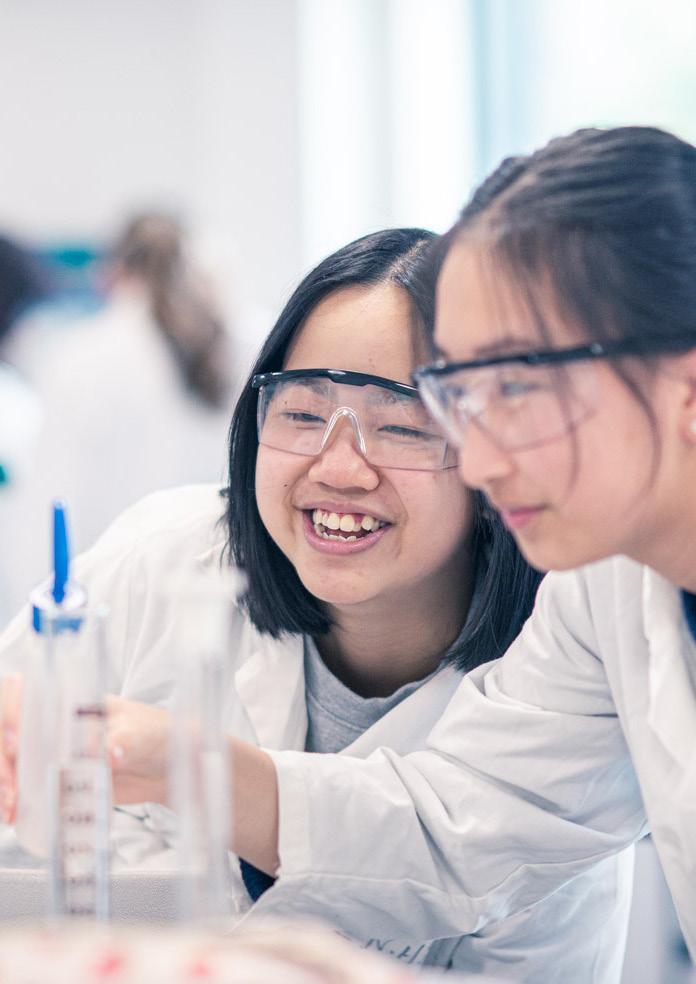
Would you like to embark on an artistic journey of self-discovery in your Sixth Form studies? The Art department provides a space in which creative and artistic imagination can take flight. It is somewhere that nurtures essential skills and expressive possibilities.
Art and Design A Levels at NHSG offer you an opportunity to fully develop and explore your chosen specialism(s), such as Fine Art, Graphic Communication and/or Textile Design whilst expanding your knowledge, understanding and skills in a range of specialist areas.
You will develop a deep understanding of your chosen specialism and the ability to critically evaluate your own work and the work of others. You are able to tailor the course to fit your individual needs, choices and aspirations in order to follow your chosen route through to further or higher education or the workplace.
All courses lead to an Art and Design qualification. Specialist options are available: Fine Art, Textile Design, Graphic Communication. If you are hoping to enter the Art world you may choose more than one A Level from the options available.
What you will study
For this A Level, the coursework comes in the form of projects which include research linked to historical and cultural references. The examination is simply another project produced in response to one of many questions offered on an examination paper and carried out over a period of several weeks.
Fine Art A Level
Fine Art concerns painting, drawing, collage, sculptural pieces and printing. It is a broad course which allows for personal development in all the traditional areas of Art. We have strong traditions in Fine Art.
Textile Design A Level
This subject involves textile printing with screens and stencils, dyeing, felt making, fashion and accessory design, machine embroidery and decorative techniques. The manipulation of textiles is created mainly for fashion but can also be used for one-off art pieces or as art for interior design.
Graphic Communication A Level
This course combines two or more of the following:
• Designing book jackets, CD covers, posters and brochures, logos and symbols, page layouts and visual communication of information.
• Illustration and advertising for a chosen product.
• Package Design – aesthetic and functional package design for specific products.

Graphic Communication can also involve creating visual meaning through Art by an expressive or interpretative response to still and moving imagery achieved through lens-based media. The course encourages the use of digital imagery through using software such as Photoshop combined with imagination and flair.
Component One:
Personal Investigation (60% of the overall A Level mark)
This involves creating the following in the chosen area of study.
(i) a portfolio of practical work showing your personal response to either a starting point, brief, scenario or stimulus, devised and provided by you with advice and support from your teacher.
(ii) a related study: an extended response of a guided minimum of 1000 words.
Personal Investigation - 120 marks
Non-examination assessment (internally assessed and externally moderated)
Component Two:
Externally Set Task (40% of the overall A Level mark)
The early release paper will be issued on 1 February by OCR and will provide a number of themes, each with a range of written and visual starting points, briefs and stimuli. A response should be based on one of these options.
Externally set task - 80 marks 15 hour examination after a preparation period from February to May Non-examination assessment (internally assessed and externally moderated)
What this course can lead to
There are many Art and Design based careers. Employers are looking for creative minds to work in all areas of their companies.
An A Level in an Art and Design will give you the skills that are prized by today’s employers.
The options for someone with a creative mind are abundant and varied. They could include Fashion Design, Teaching, Product Design, Editorial work, Museum and Gallery work, Architecture, Textile Design, Graphic Design, Filmmaking, Photography, Gaming, Media work, Set Design, App and Web Design, Interior Design, Furniture Design... the list goes on.
Biology is the ‘science of life’ and as such will give you a broad appreciation of the world of living organisms. Pick up a newspaper or listen to the news on television and Biology will never be far from the headlines; from the outbreak of pandemics to the clearing of the rainforests, questions are being asked of biologists every day.
As well as diverse and interesting subject knowledge, the course encourages an understanding of current issues related to Biology, how scientists work and how they investigate scientific problems and use the evidence they collect to draw conclusions.
You will be encouraged to question the reliability of results and the validity of conclusions. Scientific advances have greatly improved the quality of life for many people. You will look at some of these advances and the impact they have had.
The course will also enable you to develop your own research and investigative skills. It is a practical science in which you will carry out experimental work, investigating ideas and theories.
The Year 12 course covers the human digestive system, the heart and the gas exchange system and shows how an understanding of the way they work allows us to appreciate how disease affects our bodies. You will also be introduced to topics such as biological molecules, enzymes, cell structure and how substances get into and out of cells. Biodiversity, variation and its causes are also covered. It considers the range of living organisms, some of the ways they are similar to each other and how they differ. It also looks at the enormous impact humans have on biodiversity.
The topic of ecology forms an important theme in the second year of the A Level course. You will be studying the features of communities and ecosystems in order to understand how the sustainability of resources depends on managing the conflict between human need and conservation. Field work techniques will be taught during a compulsory three day residential course at Cranedale Field Study Centre in Yorkshire. You will look at some of the ways in which animals are able to detect stimuli and respond to them. This will allow you to realise that in this way they increase the probability of their survival by moving away from harmful environments and maintaining optimal internal conditions for their metabolism. You will also become aware of the way in which DNA controls the metabolic activities of cells and some of the medical and technological applications that have resulted from this knowledge.
Year 12
• Biological molecules
• Cells
• Organisms exchange substances with their environment
• Genetic information, variation and relationships between organisms
• Energy transfers in and between organisms
• Organisms respond to changes in their internal and external environments
• Genetics, populations, evolution and ecosystems
• The control of gene expression
You will sit all examinations at the end of Year 13.
There are three 2 hour written examinations: Paper 1 and Paper 2 are each worth 35% of the A Level qualification.
Paper 3 is worth 30% of the A Level qualification and includes a 25 mark essay from a choice of two titles.
Practical assessments have been divided into those that can be assessed in written examinations and those that can only be directly assessed whilst you are carrying out experiments.
A Level grades will be based only on marks from written examinations.
A separate endorsement of practical skills will be taken alongside the A Level. This will be assessed by teachers and will be based on direct observation of your competency in a range of skills.
Many A Level pupils go on to study Biology related subjects at university, others follow careers in other fields. Biology complements artistic, technological and other scientific outlooks, and can lead to a variety of careers including: Accountancy, Biomedical Sciences, Dentistry, Environmental Sciences, Law, Molecular Biology, Medicine, Nutrition, Nursing, Optometry, Pharmacy, Physiotherapy, Psychology, Teaching and Veterinary Science amongst many others. Biology is a requirement for studying Medicine and Dentistry in many universities.
Business is a subject which is constantly developing. Businesses are affected by changing trends in society as well as the events happening in the UK and abroad. As a dynamic subject, we aim to ensure that we keep abreast of changes in the economy and students are encouraged to keep up to date with news and current affairs. Business A Level is divided into three separate, but interconnected units, covering all aspects of business, from marketing, finance, operations and human resources. If you have an interest in running your own company one day or going on to study business-related courses at university, such as Management, Accounting or Marketing, then Business A Level is the subject for you.
Some girls may have studied Business at GCSE, but this is not a specific requirement. If girls have taken Business as an option at GCSE, then we would prefer a Grade 6 or above, as well as a Grade 6 or above in GCSE Mathematics and English. This is because the course will require you to handle and interpret data and calculate financial ratios and write extended essay style answers.
What you will study
12
In Year 12, we focus on the different functional areas of business and their roles, including marketing, finance, operations and human resources. We also look at the various ownership types a business may choose. From the outset you will develop real-world knowledge and practical skills to analyse data, think critically about issues and make informed decisions.
In Year 13, we focus on the importance of the business culture and its influence on success, we consider the external environment and its impact on business, including the influence of the economy, ethics and the environment. Lessons focus on strategic decision making and how businesses grow and develop and deal with change.
How you will be assessed
You will be assessed at the end of Year 13 through three papers. Paper 1 is standalone, with questions based on the first unit covered in Y12. Paper 2 is assessing knowledge mainly on the second unit, with some links to the first. Paper 3 focuses on the final unit but there is a synoptic element requiring you to draw together knowledge and skills from across the full course.
What this course can lead to
Sound business skills are actively sought by employers in all sectors. An understanding of business will help you to make sense of the world and will support you throughout your working life. Whether you choose to work in the private sector or in public services, principles of business and finance are at the heart of what can be and what is achieved. Your A Level will give you a good understanding of the challenges facing businesses, and an insight into the different functional departments within a business.
Should you wish to study further, there are numerous Business courses offered at universities, many combining Business with other subjects, such as Languages. You do not have to take Business at A Level to study the subject at university. However, it would be useful for any Businessrelated degree including Accounting and Finance, Management, Marketing, Human Resources and Public Relations. You could, of course, put the theory into practice and use your newly acquired skills to set up your own business!
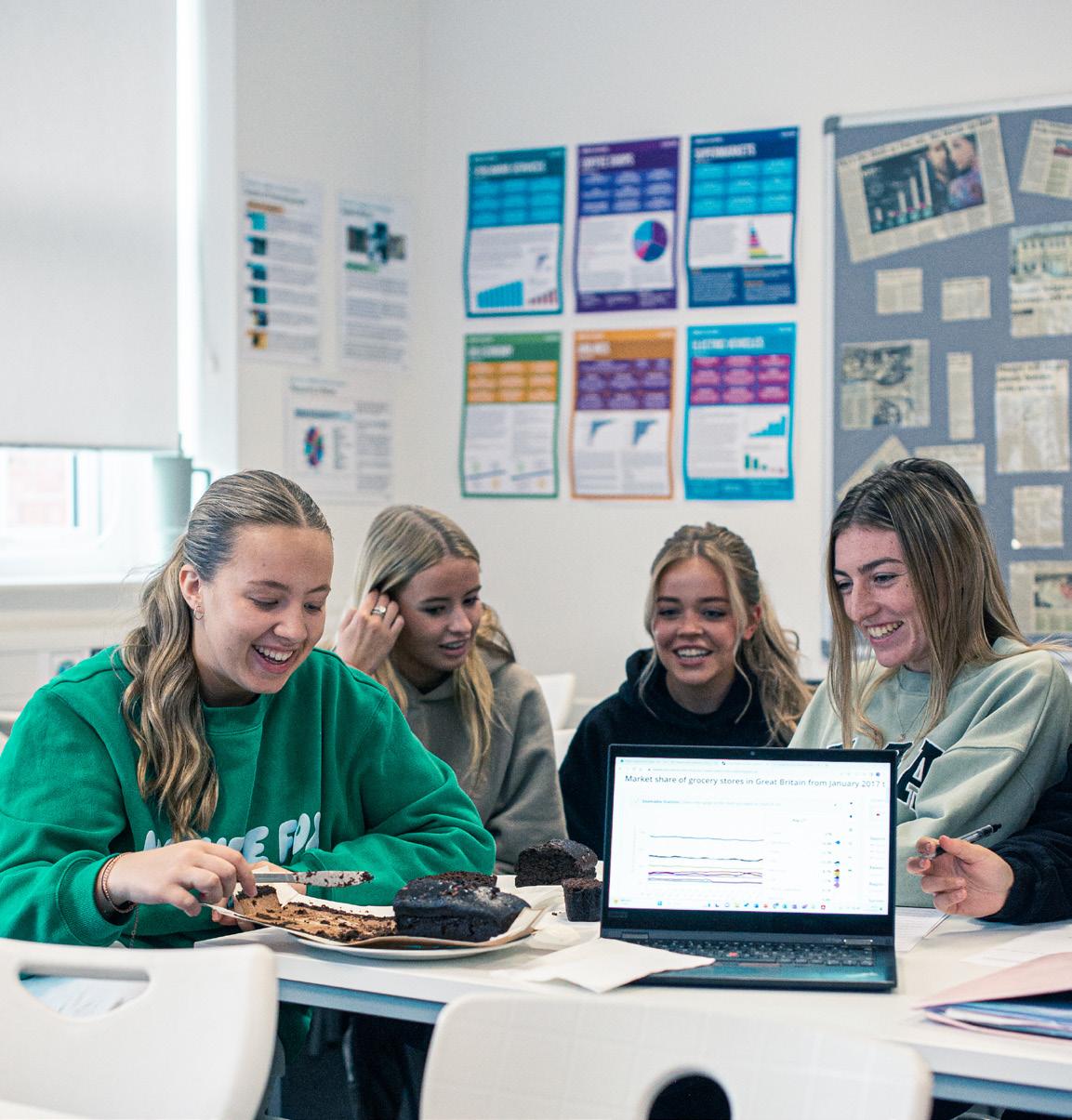
Chemistry is an exciting and interesting subject which combines intellectual challenge with investigative skills and practical work. It is a key science needed for a variety of professions from Medicine to Engineering.
Examination Board – AQA
Chemistry is a wide ranging subject which includes a study of the manufacture of essential materials such as medicines, plastics, metals and fuels. You will also study the processes which take place in living things and conservation of the environment.
The A Level course gives a fascinating insight into the reasons for the diverse nature and behaviour of our surroundings. It aims to provide a satisfying educational experience whether or not you intend to study Science beyond this level, to enable you to show an informed interest in scientific matters and to develop an understanding of scientific method.
Chemistry is essentially an experimental subject and therefore the course includes a wide range of practical work integrated into the lessons. You gain experience in a range of techniques which allows you to develop your ability to question, investigate and evaluate evidence. These practical skills are assessed internally during the course.
If you wish to follow a career in Chemistry, you can learn more through our links with Sunderland University and other work experience programmes. You are also encouraged to attend both internal and external lectures.
During the course the following units are studied:
Year 12
• Physical chemistry – including atomic structure, amount of substance, bonding, energetics, kinetics, chemical equilibria and Le Chatelier’s principle.
• Inorganic chemistry – including periodicity, Group 2 the alkaline earth metals, Group 7 (17) the halogens.
• Organic chemistry – including an introduction to organic chemistry, alkanes, halogenoalkanes, alkenes, alcohols, organic analysis.
Year 13
• Physical chemistry – including thermodynamics, rate equations, and equilibrium constant for homogeneous systems, electrode potentials and electrochemical cells.
• Inorganic chemistry – including properties of Period 3 elements and their oxides, transition metals, reactions of ions in aqueous solution.
• Organic chemistry – including optical isomerism, aldehydes and ketones, carboxylic acids and derivatives, aromatic chemistry, amines, polymers, amino acids, proteins and DNA, organic syntheses, NMR spectroscopy, chromatography.
How you will be assessed
At the end of the course there are three 2 hour examinations. Throughout the two year course your practical skills are assessed.
What this course can lead to
After success in the A Level examination, girls have pursued courses in:
• Accounting
• Agriculture
• Architecture
• Biochemistry
• Business Studies
• Chemistry
• Dentistry
• Ecology
• Engineering
• Food Technology
• Geology
• Human Nutrition
• Law
• Marine Biology
• Materials Science
• Medicine
• Natural Sciences
• Pharmacy
• Physics
• Psychology
• Teaching
• Veterinary Science
The past permeates the present and no peoples have had a greater influence on European culture than the Greeks and Romans. Our language is rich in their vocabulary and our arts and sciences owe much to their lasting achievements.
Our approach to Classics is varied: you can study the language in A Level Latin, and their culture, both visually and through their words in translation, in A Level Classical Civilisation.
What you will study
• The World of the Hero: a study of the Odyssey and the Aeneid in translation
• Greek Theatre
• Greek Religion
How you will be assessed
These topics will be examined in three written papers at the end of the two year A Level course.
What these courses can lead to
The study of Classics is highly valued both in educational and business circles.
Degrees in Classics, Latin and Classical Studies are a popular choice and boast one of the highest rates of graduate employment. In a recent survey an employer in a bank summed up the general attitude, ”Classics seems to train minds that can be used here.” Our own former pupils have found employment in such careers as Commerce, Banking, Law, Teaching, Museum Work, Nursing and Accountancy.
Former pupils with one or two Classical subjects at A Level have gained places to study:
• Classics
• English
• Sciences
• Politics
• Law
• Archaeology
• Theology
• Ancient History
• Oriental Languages
• Modern Languages
• Philosophy
• Psychology
• Geography
• Medicine
Computer Science is a practical subject where pupils can apply the academic principles learned in the classroom to real-world systems. It’s an intensely creative subject that combines invention and excitement, and can look at the natural world through a digital prism.
The aims of A Level Computer Science are to enable pupils to develop:
• an understanding of and ability to apply the fundamental principles and concepts of computer science including; abstraction, decomposition, logic, algorithms and data representation
• the ability to analyse problems in computational terms through practical experience of solving such problems including writing programs to do so
• the capacity for thinking creatively, innovatively, analytically, logically and critically
• the capacity to see relationships between different aspects of computer science
• mathematical skills
• the ability to articulate the individual (moral), social (ethical), legal and cultural opportunities and risks of digital technology.
What you will study
• The characteristics of contemporary processors, input, output and storage devices
• Software and software development
• Exchanging data
• Data types, data structures and algorithms
• Legal, moral, cultural and ethical issues
• Elements of computational thinking
• Problem solving and programming
• Algorithms to solve problems and standard algorithms
How you will be assessed
Paper 1 - Computer systems (40%) 2 hours 30 minutes
Paper 2 - Algorithms and programming (40%) 2 hours 30 minutes
Non-examination assessment - Programming project (20%)
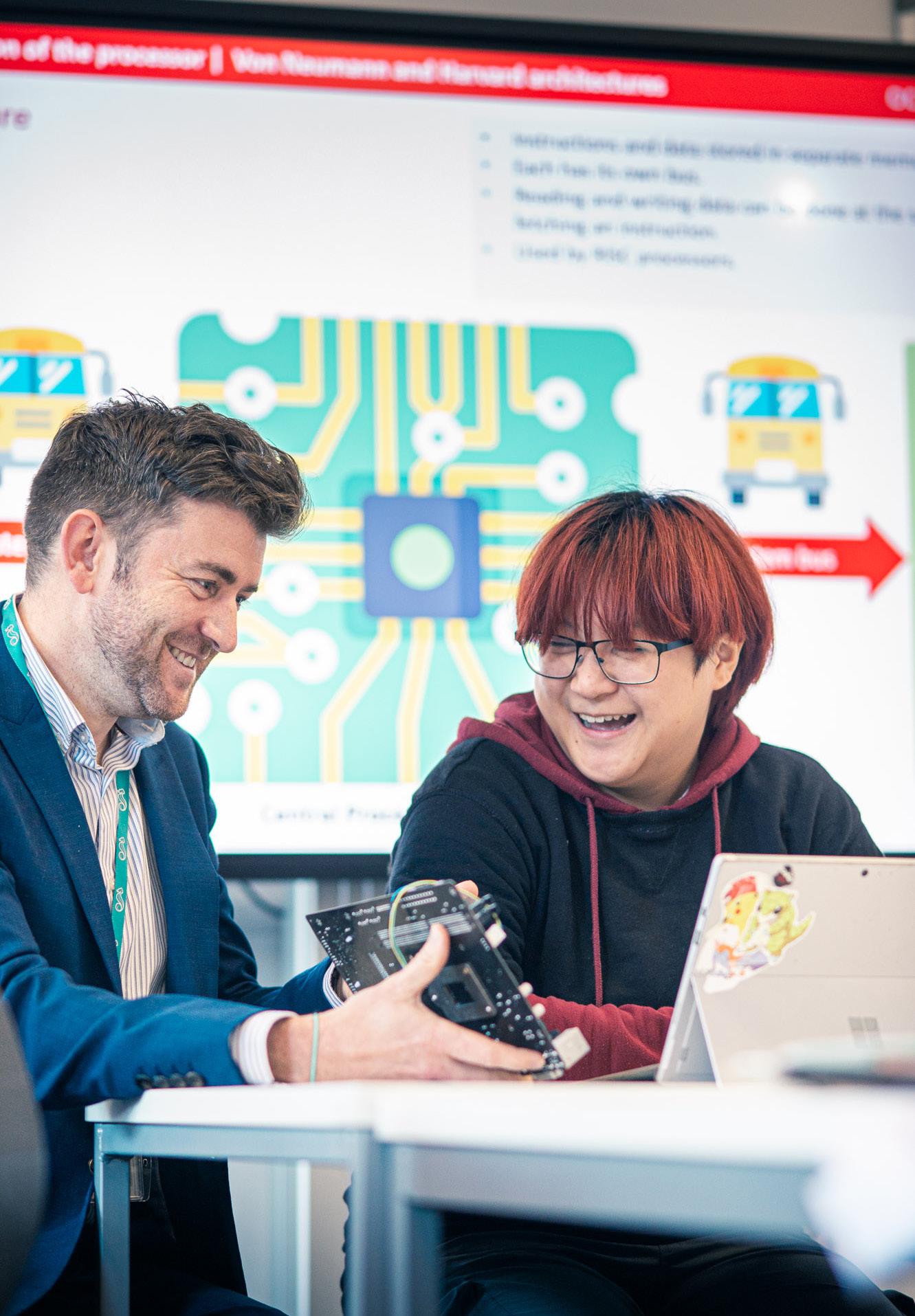
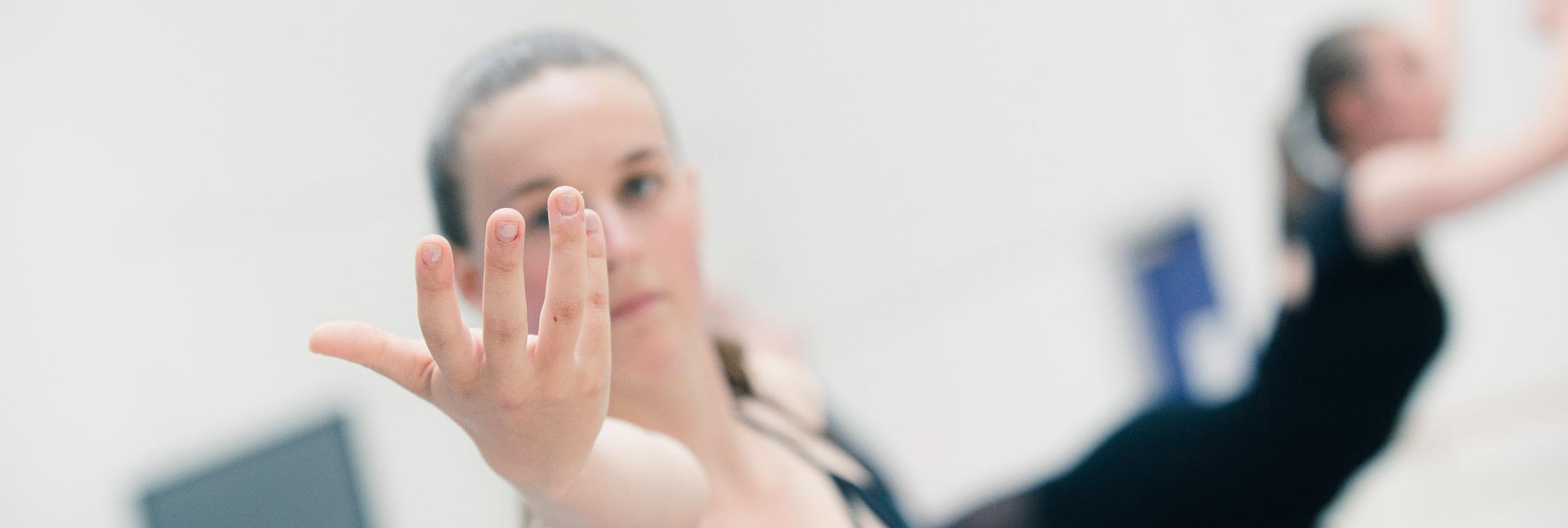
A Level Dance is a dynamic qualification which encourages you to develop your creative and intellectual capacity alongside transferable skills such as team working, communication and problem solving. All of these are sought after skills by higher education institutions and employers and will help you stand out in the workplace whatever your choice of career.
This specification reflects both historical and current dance practices, making it relevant, and inspires a lifelong passion and appreciation for dance.
What you will study
The A Level Dance specification aims to cultivate creativity by allowing individual enquiry within the areas of performance, choreography and critical engagement with professional repertoire through both practical and written responses.
Component One: Performance and choreography (50%)
• Solo performance linked to a specific practitioner within an area of study from Component Two.
• Solo performance or performance in a quartet (in any style within the defined genres of Ballet, Jazz or Modern Dance).
• Group choreography from one of four starting points set by AQA. You will also complete a programme note to support your practical assessment.
Component Two: Critical engagement (50%)
You will study two professional dance works and their corresponding areas of study. The set works will allow you to complete in-depth analysis of the choreography and production of the work to understand why choreographers make certain creative choices to communicate their intention effectively. Areas of study provide you with the opportunity to investigate the key changes in the development of dance linked to a genre and allow you to demonstrate your contextual understanding.
How you will be assessed
Component One: 50% of the A Level Assessed by a practical performance which is recorded and shared with an external assessor from AQA.
The examination normally takes place between March and May of Year 13.
Component Two: 50% of the A Level
One written examination lasting 2 hours 30 minutes. The paper will comprise both short answer questions and three essay questions to assess knowledge, understanding and critical appreciation of two set works and their corresponding areas of study.
What this course can lead to
An A Level in Dance is an excellent qualification for anyone considering a career in the creative or performing arts. This can lead to further undergraduate study of dance at university or at a Dance Conservatoire. Recent leavers went on to study at the Northern School of Contemporary Dance (NSCD) in Leeds and Shockout in Manchester. Former pupils have also gone on to study at London Studio Centre, Urdang Academy, Wilks Performing Arts Academy and Leeds Conservatoire, which are some of the finest professional training institutes in the country. A number of previous A Level pupils have successfully completed undergraduate degrees in the performing arts at institutions such as Arts Educational School, Liverpool Institute of Performing Arts and the University of Surrey. Dance develops many key transferable skills which can be utilised in a range of subjects at undergraduate level. Previous pupils of A Level Dance have also gone on to study subjects such as Psychology, Law and Medicine.
As the course is delivered by Gateway Studio, pupils have been involved in professional projects, performances and work placements at professional dance organisations and companies.
This practical, intellectual and artistic subject is designed for girls who enjoy performing in, reading and watching plays. Through various visits (usually including a three day trip to London) you will be shown the amazing diversity in Theatre and will learn to analyse, interpret and create imaginative and compelling performances, whilst becoming a more competent Theatre practitioner.
What you will study
Whilst this A Level is rigorously academic, the teaching is largely practical and offers a unique approach to learning. It is an active and creative course which aims to nurture your enthusiasm for and interest in Theatre, as an audience member and as a performer, designer and director.
In practical work, the process of creating a performance encourages you to use negotiation, debate and research skills. This multi-disciplinary approach to study will equip you with a range of transferable skills in articulating thoughts, exploring ideas, sharpening communication skills and providing you with the ability to work within a group situation both in a practical and academic setting and will also encourage you to think independently. The confidence gained through Drama and Theatre will enable you to build your confidence and encourage you to use your leadership skills.
It is important that you are interested in gaining a greater understanding of how theatre and plays work, and that you are keen to be involved with performances.
How you will be assessed
The Edexcel Advanced GCE in Drama and Theatre consists of two coursework components and one externally examined paper.
Component One: Devising (40%)
You will devise an original performance piece using one key extract from a performance text and a theatre practitioner as stimuli. You are able to approach this piece as a performer or designer. Internally assessed and externally moderated, there are two parts to the assessment:
1) A portfolio (60 marks)
This can be handwritten/typed evidence between 25003000 words or recorded/verbal evidence between 12-14 minutes or can be a combination of handwritten/typed evidence (between 1250-1500 words) and recorded/ verbal evidence (between 6-7 minutes).
2) The devised performance/design realisation (20 marks)
Component Two: Text in Performance (20%)
You will take part in a group performance as an actor or designer in one key extract from a performance text. You will also perform a monologue/duologue or create a design realisation from one key extract from a different performance text.
This is externally marked by a visiting examiner.
Component Three: Theatre makers in Practice (40%)
Written examination
The examination is 2 hours 30 mins
The examination will be made up of three sections:
Section A: A choice of one of two statements requiring you to evaluate a live theatre performance.
Section B: You will practically explore a set text in order to be able to answer two extended response questions on an extract from it (you will be provided with the extract in the examination).
Section C: You will interpret a second performance text for a contemporary audience.
What this course can lead to
An A Level in Drama and Theatre provides the perfect foundations for a Drama degree or Drama school training; however, the skills developed through this course are relevant to many different academic courses at top universities and other professional areas.
You can progress from this qualification to:
• Drama schools and university courses that relate directly to Drama and Theatre.
• University courses that will benefit from the skills developed by this course, for example; Law, Human Resources, People Management, Media, Events Management, Creative Arts.
• Professions where people skills are essential, for example Management, Medicine, industry and business environments.
• Professions where time management, confidence, the ability to work collaboratively and to meet deadlines are desirable.

Economics is not just a subject – it’s the key to understanding how the world we live in works. From global financial crisis to how markets misallocate resources, economics gives you the analytical tools to better understand the realworld issues that affect our daily lives. If you want to know more about why prices are rising, what drives economic growth and why governments don’t have all the answers then economics is for you.
What you will study
Over the course of the two years, you will focus on two main areas:
Microeconomics - explores the behaviour of individuals, firms and markets developing the key concepts of supply and demand, competition, labour markets and market failure.
Macroeconomics - focuses on the big picture looking at the economy as a whole and explores the big questions of economic growth, inflation, unemployment and balance of payments.
The skills you will develop
The course will develop your analytical skills and encourage you to think critically about everyday issues and problems and equip you with transferable skills that are invaluable in life. The course develops practical skills to evaluate data, debate ideas and develop a logical chain of argument to the problems that people experience in their daily lives. By reading this you are already, if unbeknown to yourself, considering the basic economic problem scarcity and choice. You have chosen to use your scarce resource of time to consider economics at A Level as one of your subject choices.
How you will be assessed
You will be assessed at the end of Year 13 through three 2-hour examinations.
What this course can lead to Economics is a respected qualification that will open doors to a vast array of undergraduate degrees and career opportunities. Common career destinations for Economics graduates include banking, the commercial sector, Industrial and Public Sector Management and Finance Professionals, such as Investment Advisers.
Whilst not all Economics degree courses require A Level, it will provide a greater choice of institutions. Anyone doing a course linked to a career mentioned above would benefit from the course but it also complements many science courses including Engineering and Medicine. It should be noted that some, although not all, undergraduate courses require A Level Mathematics.
“A word after a word after a word is power.”
Margaret Atwood
A passion for reading is the most important requirement for the study of English Literature. More than that, though, you will need to enjoy reading what critics have said about the texts that we study and you will have to read about the context in which they were produced. Discussion and debate form the backbone of most lessons in English Literature, so you have to be prepared to voice your opinions and have confidence in your own ideas.
Essays will form the bulk of your written work: through them, you will sharpen your powers of comprehension, interpretation, argument and communication.
What you will study and how you will be assessed
“Some books should be tasted, some devoured, but only a few should be chewed and digested thoroughly.”
Francis Bacon
You will study a range of classic and modern writing and prepare for an unseen element in the examination. You study poetry, drama and prose and the texts will include a play by Shakespeare. You will also receive a wider reading list and will be expected to read at least some of the selection of books on it.
The A Level course is 20% coursework and involves some comparison of texts and some close study of the language that writers use. For the comparative coursework, you will be able to choose the area of study and the texts that you wish to explore, which will allow you to pursue some of your own areas of interest.
Currently the course explores the following texts:
• Hamlet by William Shakespeare
• Edward II by Christopher Marlowe
• Paradise Lost by John Milton
• 1984 by George Orwell
• The Handmaid’s Tale by Margaret Atwood
What this course can lead to
“The more that you read, the more things you will know. The more that you know, the more places you’ll go.”
Dr Seuss.
English Literature makes a great combination with History and Classics. There are obvious connections with Drama, but also with the other creative arts. Some girls who are taking sciences, maybe with the intention to go on to study Medicine, take English Literature as part of their development of another aspect of their understanding of the world around them.
People who take English Literature go on to study all sorts of degrees at university: it is accepted by the most academic institutions and the essay-based nature of the assessment makes it an ideal starting point for courses such as Law. English A Levels are always useful for Journalism courses, too.
An understanding of food science and nutrition is relevant to many industries and job roles. Care providers and nutritionists in hospitals use this knowledge, as do sports coaches and fitness instructors. Hotels and restaurants, food manufacturers and government agencies also use this understanding to develop menus, food products and policies that support healthy eating initiatives. This is an Applied General qualification and is designed primarily to support pupils progressing to university. It has also been designed to offer exciting, interesting experiences that focus learning through applied learning, i.e. through the acquisition of knowledge and understanding in purposeful, work-related contexts, linked to the food production industry.
Examination Board – WJEC
What will I learn on this course?
This qualification provides an in-depth understanding of food science, nutrition, and their application in realworld contexts. You will explore the relationship between diet and health, food safety, and the development of innovative food products. The course combines academic theory with practical skills, preparing you for higher education or careers in areas such as dietetics, food science, public health, and product development.
What will you will study
• Nutritional needs across the life stages
• Practical food production skills
• Principles of food hygiene and food safety
• Optional units on food experimentation or current issues in food science and nutrition
How will I be assessed?
Assessment is a combination of written examinations and non-examined assessments (coursework):
In Year 12:
· Unit 1: Nutritional needs across the life stages – Written exam (1 hr 30 mins) – 25%
· Unit 2: Developing practical food production skills –Internal assessment – 25%
In Year 13:
· Unit 3: Principles of food hygiene and food safety –Written exam (1 hr 30 mins) – 25%
· Plus one optional unit (Unit 4: Experimenting to solve food production problems OR Unit 5: Current issues in food science and nutrition) – Internal assessment – 25%
How is this course delivered?
The course is taught through a mix of classroom-based theory, practical sessions in a fully equipped kitchen, and independent research. You will develop advanced cooking techniques, understand food safety legislation, and apply scientific principles to food production.
How is it graded?
- E
What can I do after this course?
This qualification supports progression to higher education courses such as:
· BSc Food and Nutrition
· BSc Human Nutrition
· BSc Public Health Nutrition
· BSc Food Science and Technology
It is also relevant for careers in:
· Dietetics and nutrition consultancy
· Food product development
· Public health and food policy
· Catering and hospitality management
Further Information
The examination board is still in the process of releasing the new specification. For more information about this course, please contact Mrs V Mansueto.
By studying Geography you will learn from the real world, about the real world. You will learn that Geography is a science that seeks to describe, explain and evaluate the character of places and the distribution of people, features and events as they develop on different scales over the surface of the earth.
Examination Board – Cambridge International
You will learn that we need to understand the geographical influences and relationships which link people and their surroundings and the importance of safeguarding the environment. You will appreciate that as international links become closer, easier and faster, we need more than ever to understand the geography of the world. You will understand and appreciate that the cultures and backgrounds of people from all over the world help us make the most of our multicultural society.
The subject draws on factual knowledge from both the Pure Sciences and the Arts, and aims to develop the analytical powers of the scientist and the descriptive and interpretative skills of the humanities. It has the great advantage of combining successfully with virtually every A Level subject and can act as a useful link between the Arts and Sciences.
What you will study and how you will be assessed
Content overview For Cambridge International AS Level Geography.
Candidates study all the following topics:
Paper 1 - Physical Geography
• Hydrology, river processes and hazards
• Atmospheric processes and global climate change
• Earth processes and mass movements
Paper 2 - Human Geography
• Population and migration
• Water resources and management
• Urban areas and management
For Cambridge International A Level Geography:
Candidates study all the AS Level content and four A Level topics, a choice of two topics for Paper 3 and two topics for Paper 4.
Paper 3 – Global Environments two topics from:
• Tropical environments
• Coastal environments
• Hazardous environments*
• Arid environments*
Paper 4 – Global Themes two topics from:
• Climate change impacts and governance
• Environmental issues and management*
• Trade, aid and tourism
• Disease and geography*
*A2 topics we are set to study
All four papers are written examinations and are weighted equally (25%)
Please note:
Pupils studying A Level Geography will sit the AS examination (Papers 1 and 2) in November of Year 13.
What this course can lead to
Geography continues to be a subject highly regarded by universities. According to research from the Geographical Association, Geography has been defined among the key ‘facilitating’ or ‘hard’ subjects in a guide compiled by the Russell Group and has been identified as one of ten recession-proof degree subjects.
Why do employers prefer Geographers?
1. Geographers can deal with data and people
2. Geographers have critical analysis and writing skills
3. Geographers can keep pace with change - they have the level of rigour, knowledge, conceptual thinking and intellectual curiosity required in the labour market.

The study of History in the Sixth Form offers you the opportunity to develop your skills of analysis and exposition. Since Sixth Form History involves the evaluation of evidence, the construction of convincing arguments and a high degree of literacy, it makes an ideal prelude to many courses or careers including Law, Journalism and the Civil Service, quite apart from the more directly related areas such as teaching or museum and archive work.
Examination Board – AQA
Girls who study A Level History are expected to contribute to class discussion and read widely around the subject.
Component One
1H Tsarist and Communist Russia 1855-1964
Over the two years, you will examine the decline of Tsarism in Russia and the 1917 revolutions.
You will move on to study the attempts to establish a Communist state under the leaderships of Lenin, Stalin, and Khrushchev. This breadth study allows you to explore the overarching themes of political, economic, and social change that saw the country experience a turbulent century of revolution, war and the establishment of a totalitarian superpower.
Component Two
2M Wars and Welfare: Britain in Transition 1906-1957
Over two years this depth study allows a deep dive into early modern British History from the Liberal ‘People’s Budget, the Irish Home Rule Crisis, the Suffragette movement, and the effects of WWI and then the depression on British politics, economics, and society. In Year 13 you will look at 1930s economic crisis, the rise of British fascisms and the abdication crisis of 1936 before studying British policy through WWII and then the creation of the modern welfare state and post war rebuilding. This course is full of fascinating characters and events and helps pupils understand how Britain became the country it is today.
Component Three
This is a coursework module (NEA). You will undertake a historical enquiry (extended essay) on the subject of the Columbian Exchange 1492-1625.
This is a 4,500-word historical enquiry which must be completed by Easter in Year 13. In preparation for this study, you will take a short course on the significant economic, social, and cultural changes that came from Europeans discovering the ‘New World’ of North, Central and South America, how violence, culture, trade, ecology, and germs were transported across both sides of the Atlantic and changed both societies permanently in ways that still are apparent today. In this part of the A Level you must research independently and use all the historical skills you have developed to assess the significance of key events and to show an awareness of different historical interpretations.
This module is superb preparation for the study of ‘essaybased’ subjects at university.
How you will be assessed
Components One and Two are examined separately at the end of Year13 and are together worth 80% of the final grade.
Component Three will be completed by the end of the Spring Term of the second year of study and is worth 20% of the final grade.
What this course can lead to
This course will give you a chance to develop your awareness of political, economic and cultural issues and provides an ideal background if you wish to study History, Politics, Economics or Social Sciences at university.
In recent years many of our A Level Historians have gone on to read History at university. In Year 13 there are extra lessons available to prepare girls for university entrance, including entrance to Cambridge and Oxford.
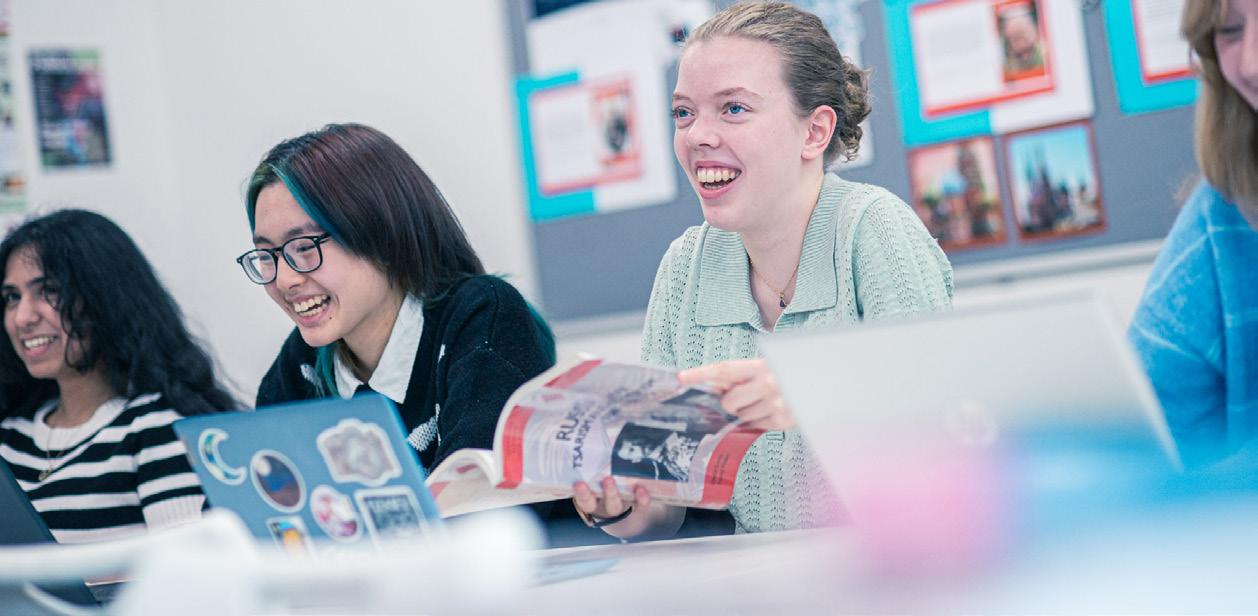
The past permeates the present and no peoples have had a greater influence on European culture than the Greeks and Romans. Our language is rich in their vocabulary and our arts and sciences owe much to their lasting achievements.
Much of the A Level course is devoted to the detailed study of literary texts, through which you are encouraged to develop your linguistic knowledge, personal response and the skill of critical analysis. The rest of the course contains a variety of language work, which is examined by translation and comprehension. Latin has had a vast influence on English, yet is so significantly different from English that its translation and comprehension will really develop your skills of analysis and expression. Latin literature will provide both intellectual excitement and a moving experience.
How you will be assessed
For A Level Latin there are four written examinations:
Unseen translation
1 hour 45 minutes – 33% of overall result
Prose composition or comprehension
1 hour 15 minutes – 17% of overall result
Prose literature
2 hours - 25% of overall mark
Verse literature
2 hours - 25% of overall mark
What these courses can lead to
The study of Classics is highly valued both in educational and business circles.
Degrees in Classics, Latin and Classical Studies are a popular choice and boast one of the highest rates of graduate employment. In a recent survey an employer in a bank summed up the general attitude, ”Classics seems to train minds that can be used here.” Our own former pupils have found employment in such careers as Commerce, Banking, Law, Teaching, Museum Work, Nursing and Accountancy.
Former pupils with one or two Classical subjects at A Level have gained places to study:
Classics
English
Sciences
Politics
Law
Archaeology
Theology
Ancient History
Oriental Languages
Modern Languages
Philosophy
Psychology
Geography
Medicine
Can you predict where an arrow will fall from a bow? Plot the path of a snooker ball on a table? Maximise the area of a field with a given length of fence? Predict the outcome of the toss of a coin? Find the meaning of the square root of -1? Find the equation of the spiral shape on a shell? Mathematics puts logical thought and reason into situations which appear too complex to grasp. It answers questions but can be appreciated simply for the elegance of its solutions.
The Mathematics and Further Mathematics A Level courses offer a study in Pure Mathematics, Mechanics and Statistics. They are challenging, but rewarding, courses which will equip you to continue with a study of Mathematics in the future whilst also supporting a wide range of other subject areas. Pure Mathematics builds on many of the areas covered at IGCSE. You will develop your understanding of trigonometry beyond simple triangles, use algebra in more complex ways and combine methods involving angles and straight lines to solve challenging problems. You will also be introduced to new concepts such as logarithms, matrices and complex numbers. (Remember being told you cannot have the square root of a negative number? Well you can!).
All of these ideas will be used in real life situations. Mechanics uses Mathematics to describe the motion of objects and how they respond to forces acting on themfrom cars and lorries on roads to satellites orbiting around a planet. It includes topics such as energy and collisions. Mechanics links particularly well with A Level Physics and is relevant to university courses in Mathematics, Physics, Engineering and Architecture.
An understanding of Statistics and its uses and limitations is an important skill. On this course you will meet the ideas of randomness and variability, and the way in which these link to probability theory. You will also learn the most common statistical techniques for evaluating data, drawing reliable conclusions and making predictions in situations where uncertainty is built in.
Both courses are assessed at the end of Year 13 by a series of written examinations. You can only take Further Mathematics if you have already chosen to study Mathematics.
What this course can lead to
Many options for Mathematics related studies are open to you.
These include:
• Accountancy
• Architecture
• Business Studies
• Computing
• Economics
• Engineering
• Law
• Management
• Mathematics
• Medicine
• Physics
• Pure Science
• Surveying
AS Core Maths in context
Edexcel Core Maths in Context is a valuable post-16 qualification designed to help pupils develop practical mathematical skills that are directly relevant to real life, work, and further study. Tailored for those not taking A Level Maths, this course supports subjects such as psychology, sciences, geography, and business by strengthening analytical and problem-solving abilities. Pupils explore topics including statistics, financial maths, and data interpretation—essential tools for making informed decisions in a data-driven world. With a strong focus on application over theory, Core Maths helps learners grow in confidence, preparing them for both higher education and the demands of modern employment.
Two written examinations are taken at the end of Year 12.
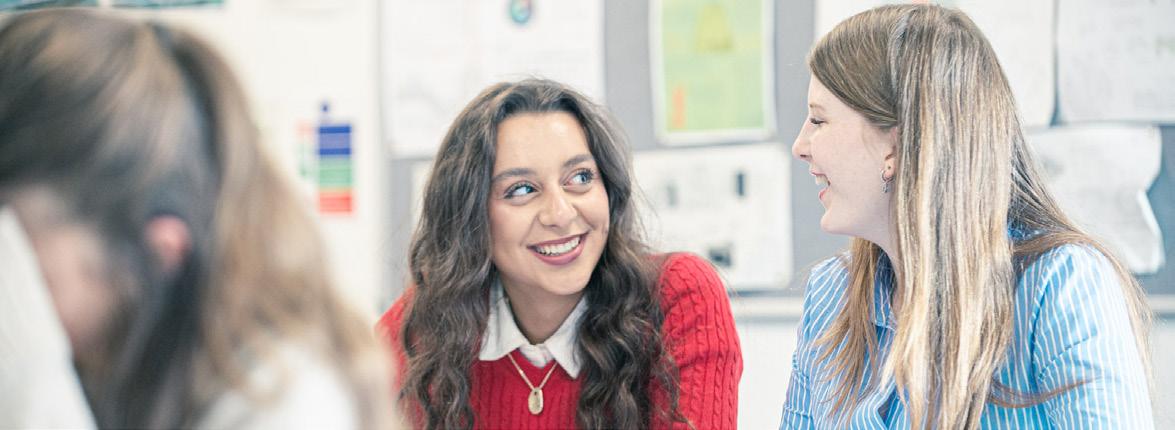
We offer A Level courses in French, German and Spanish. The ability to use one or more foreign languages at a more advanced level than GCSE gives young people a considerable advantage over their monolingual peers.
The Modern Languages A Level specification is designed to develop further the skills required for GCSE – Listening, Reading, Speaking, Writing and Translation.
In addition to the basic skills you will begin a more detailed study of the culture and way of life of the country concerned and if you are particularly interested in any aspect you will be encouraged to pursue it in Year 13, through the study of a specific piece of literature, a specific film, and more widely through the broader study of the cinema, theatre, literature, politics and current issues of the countries whose language you are studying.
The whole course emphasises a practical, communicative approach to language learning and provides access to a wide range of up-to-the-minute technological aids that will help you to speak, write, read and listen to the language with confidence.
We use established resources which include a well-stocked library of recent publications, fully equipped teaching rooms, and an online multi-skill resource, accessible from School and home via Teams, as well as other ICT facilities. The extensive use of ICT facilitates independent learning, helping to meet the individual learning styles of our pupils.
The spoken language plays a major role in the course, because the ability to communicate orally is the key skill. You will have regular opportunities to communicate with your teacher, where the specific strategies and skills required for the oral examinations are developed, i.e. stimulus cards, improvisation and debate on topical and cultural issues. You will be encouraged to visit the country at least once during the two years of A Level study and an extended stay in the summer at the end of Year 12 is recommended, either on an exchange or a work placement, which we are able to facilitate. Even with the provision of so many resources in School, nothing can compete with ‘total immersion’ in the country.
A Level Modern Foreign Languages offer you opportunities to:
• Develop and build on the skills acquired at GCSE
• Facilitate foreign travel
• Gain an insight into another culture and society
• Build a sound basis for further study
• Enhance your education and employment prospects beyond the UK
The syllabus is made up of four modules:
1 Social issues and trends
2 Political and artistic culture
3 Grammar
4 Classic and Contemporary Literature and Film
How you will be assessed
The A Level course assesses the four key communication skills of speaking, listening, reading and writing.
This is assessed in three papers:
Paper 1 - Listening, Reading and Writing with grammar questions.
Paper 2 - Writing - Two written responses on one film and one literary text or two literary texts.
Paper 3 - Speaking - One presentation on an extended research project on a topic freely chosen by the pupil based on their own interests (i.e. medicine, architecture, fasion, politics etc).
• One conversation based on a subtheme:
• Current trends and other aspects of the society
• Current affairs issues
• Artistic culture
• Aspects of political life

Music is a huge part of all of our lives. We listen to it every day, go to see concerts, and are moved by film soundtracks. But do we know why? Music A Level will not only reveal how music taps into our emotions, but will also give you the skills to create your own.
Examination Board – Eduqas
Studying Music at NHSG means:
• Making use of the excellent Music School facilities and resources.
• Taking advantage of a plethora of performance opportunities within and beyond school.
• A department geared to getting the best grade possible, and affording every opportunity possible to each girl.
What you will study and how you will be assessed
At NHSG you will study the Eduqas A Level Music syllabus. This course has a high degree of flexibility. You must complete the appraising section, but you can choose to specialise in either composition or performance depending on your strengths – a choice that will be made at the end of Year 12.
Depending on this choice, the structure is:
Unit 1 – Performing
This will be either 25% or 35% of the course, depending on your choice. At the end of two years, there is a marked performance with a visiting examiner on your chosen instrument. The expected standard at this stage will be Grade 8. Throughout the two years there will be plenty of performance opportunities and chances to refine and hone your skills.
This will be either 25% or 35% of the course, depending on your choice. You will work on composition skills throughout the two year course, culminating in the creation of two or three compositions in different styles. You will study harmony as well as a way of cementing a coherent skill set in composition.
There are three areas of study. The first is the history of the symphony from 1750 – 1900. You will look at how this great form came into being, and study the great symphonic composers with our set work being Haydn’s Symphony 104 – ‘London’. The second area of study is Musical Theatre, which will take in all of the great musicals and musical composers of the second half of the 20th century to today. Thirdly, we will look at 20th century music such as Debussy, Satie and Schoenberg. You will sit a two hour exam at the end of Year 13, worth 40% of your overall grade.
What this course can lead to
Music is a highly regarded academic subject, with a high level of creativity. It is highly regarded by universities for entrance into a wide range of courses. Former pupils have gone on to study Law, Fine Art, Medicine, English, and of course, Music – in a variety of forms.

Physical Education is a course you may never have considered, but just take a moment to see what exciting course content awaits if you choose to study PE as an academic qualification.
Board – AQA
Physical Education provides an insight into sport beyond the act of performance. The course gives a stimulating and varied theoretical investigation into all aspects of sport and health through an understanding of how our bodies and minds work. It considers the impact of historical and contemporary political decision making on the sporting success of our nation and beyond.
What you will study Skills
The field of study is wide and offers the opportunity to demonstrate skills in essay writing and quantative data analysis using knowledge from a variety of fields. In addition, the verbal coursework provides great preparation for delivering presentations and interviews.
Knowledge
Study includes three main theoretical strands:
1 Physiological Factors
How the muscular, respiratory and cardiovascular systems both function and supply energy for sports performance; the impact of exercise, training, diet and nutrition on performance and health; the physiological impact of injury and recovery from injury; the impact of force and how to optimise technique through application of biomechanical principles; how we learn and how that affects training and performance.
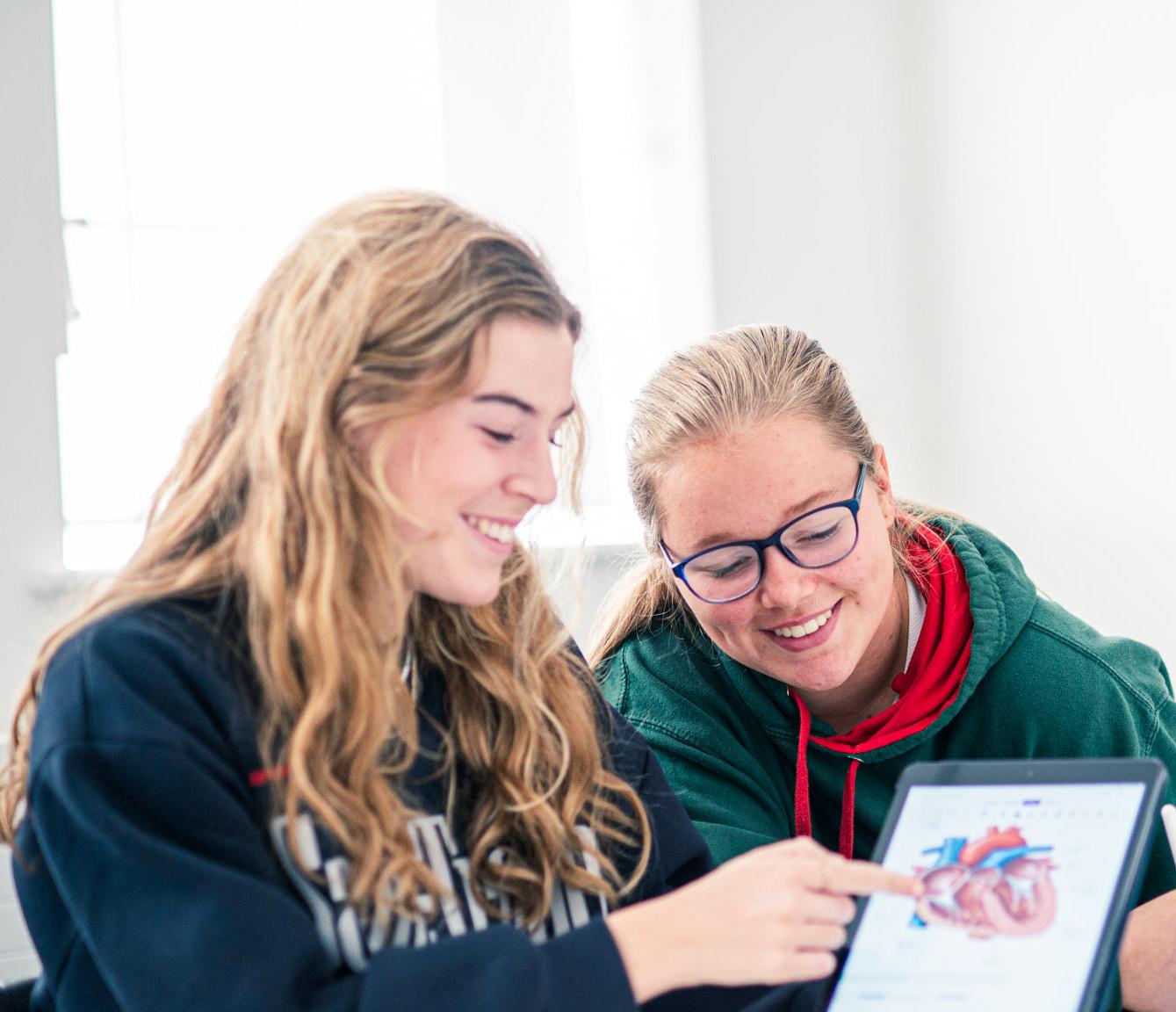
2 Psychological Factors
How personality impacts an our ability to give high level performance and take on leadership roles; personal traits such as confidence and ability to manage stress in relation to performance.
3 Sociological Factors
The emergence and evolution of sport in our society; economic and political impact of sport in society through study of the Olympic Games and major sporting events such as FIFA World Cup; drugs in sport; commercialisation and media impact; the impact of modern technology on sports performance.
How you will be assessed
There are two written examinations at the end of Year 13.
•Factors affecting participating in physical activity and sport - 2 hours
•Factors affecting optimal performance in physical activity and sport - 2 hours
• Practical assessment and written coursework - 30%
What this course can lead to
This is a subject totally in keeping with our modern lifestyle and the debate about the commercialisation of sport in our society. It provides the theoretical knowledge and skills base for a range of careers in this ever growing employment sector. The traditional male dominance is being eroded and doors are being opened by women not only as professional sports players and coaches, but also as managers, agents, physiotherapists, doctors, psychologists, engineers, dieticians, journalists and lawyers.
‘Physics’ derives its name from the Greek word for Nature. It is the study of matter, energy and their interactions, the study of which takes us away from the world of celebrity and veneer to the furthest flung reaches of the Universe to try to understand how everything works and how it all fits together.
Physics does not just look at the grand in scale; it gazes at the very small particles that constitute matter itself - the very building blocks of everything we see around us. Physics is a challenging subject that brings together observational science and mathematical theory.
What you will study
The A Level course is designed to provide a balanced and coherent study of Physics in which you are given the opportunity to explore certain areas of the subject in depth. Throughout the course, you develop your ability through experimental and investigative work and increase your skills in analysing evidence to draw conclusions.
What you will gain by studying Physics
• A greater understanding as to how the world works
• An ability to predict the consequences of actions
• Understanding of theoretical models
• Grasp of the unifying ideas of the universe
Topics covered on the Physics course include some that you have seen before, but taken to a greater depth: Forces, Resistance, Electrical Theory and Kinetic Energy. Other topics are new and you will explore Wave Phenomena and the weird world of Quantum Theory. Topics such as Nuclear Physics (including Fundamental Particles), Medical Imaging and Modelling the Universe are also covered, plus many others.
What you need to be able to study Physics
1 Fundamental is wanting to understand how things work.
2 A good GCSE in Physics or Trilogy Science.
3 An ability to manipulate equations to solve questions.
4 An excellent work ethic that allows you to spend time thinking.
If you are intrigued about the Universe around you from the very small (a quark) to the very large (the Universe) and love a challenge, then Physics is for you.
How you will be assessed
There are three written examinations at the end of the A Level course.
• Modelling Physics – 2 hours 15 minutes
• Exploring Physics – 2 hours 15 minutes
• Unified Physics – 1 hour 30 minutes
Throughout the two year course your practical skills are assessed.
What this course can lead to
Studying Physics enables you to progress into further or higher education to follow courses in Physics, Engineering, one of the other sciences or related subjects, or to enter employment where a knowledge of Physics would be useful. Physics can lead to numerous career paths from research and development, to computer software or even banking. Physicists are seen as able problem solvers who are much in demand. Physics A Level also provides an interesting and stimulating experience even for those who do not wish to pursue the subject further.
Politics is a vibrant contemporary course that allows you to explore the political systems of the UK and other countries. It involves political theory, a study of representative democracy and an analysis of how government operates. If you are interested in current political affairs and want to deepen your knowledge of political systems, then this course is a superb A Level option.
What you will study
The A Level has three components.
1 UK Politics
• Democracy and Political Participation
• Party Policies and Ideology
• Elections and Voting Behaviour
• Pressure Groups
• Role of the Media
2 Governing the UK
• The Constitution and the role of the EU in British Politics
• Parliament
• The Prime Minister and Cabinet
• Judges and Civil Liberties
In Year 13 there is a module on the US Political System.
3 Comparitive Politics – USA
• US Elections and Political Parties
• US Pressure Groups
• US Constitution
• The Presidency and Congress
• The US Supreme Court and Civil Liberties
You will also have to compare the US system to that of the UK.
How you will be assessed
Each component will be separately examined in three 2 hour papers at the end of Year 13 with all parts equally weighted.
What this course can lead to
Politics is regarded as a facilitating subject by Russell Group Universities and is therefore compatible with any academic degree subject. A study of Politics is a good basis for further studies of Law, History, PPE and Social Sciences. A Politics degree will give great flexibility in future career paths but has direct links to work in Government, Journalism, Law, Finance and Banking and International Business and Trade.
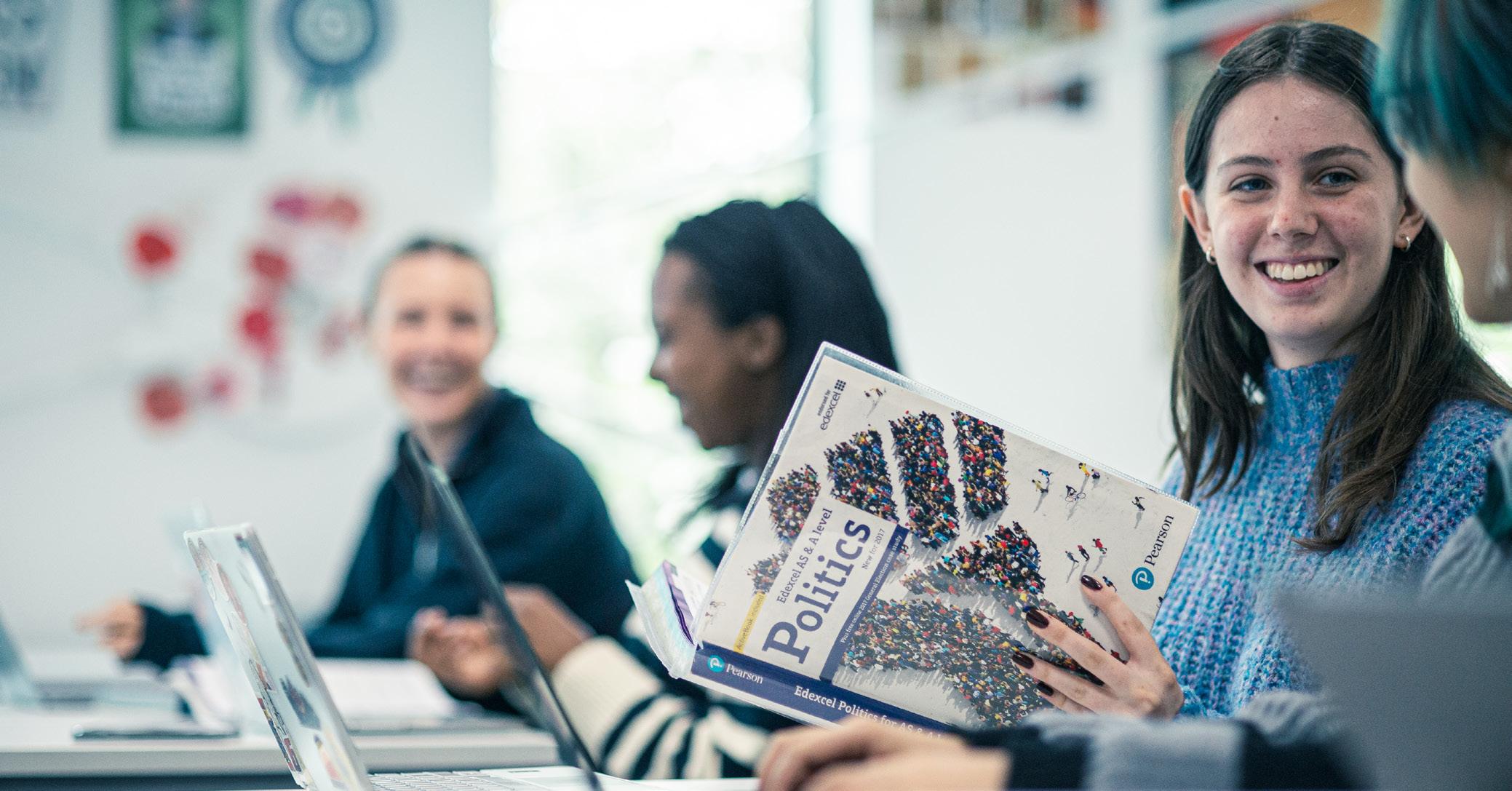
Psychology is the scientific study of the mind and behaviour. The course is interesting and enjoyable. A Level Psychology covers a diverse selection of topic areas including attachment, memory and social influence and it is in the investigation of these that we address a number of questions which psychologists research: Why do children form attachments to their caregivers? Why do we forget things? Why are people willing to obey others?
Psychology is fun! It is a challenging, but accessible and enjoyable subject. It is a very popular choice at A Level. Psychology will enable you to develop a range of skills including essay writing, analysis, evaluation and mathematical skills, as well as providing an understanding of how psychological investigations are conducted.
What you will study
Year 12
Paper 1 – Introductory topics in Psychology
This paper includes the study of social influence, memory, attachment and clinical psychology and mental health.
Social influence
This is the study of people and their behaviour. The topic covers conformity and obedience as well as the influential research of Milgram and Asch.
Memory
Here we study the structure of memory, why people forget, how people recall information in eyewitness testimony and how leading questions affect their accounts.
Attachment
Here we study how attachment types differ between people, different culture and how these important attachments may have a significant impact on adult romantic relationships.
Clinical Psychology and Mental Health
This topic encompasses the study of mental health. We look at how mental health is defined and focus on three psychopathologies: OCD, depression and phobia.
Paper 2 – Psychology in context
This paper includes approaches in Psychology, BioPsychology and Research Methods.
Approaches in Psychology
The focus of this topic is the theoretical underpinnings of the subject including behaviourism, social learning theory and the biological approach to explaining behaviour.
BioPsychology
Here we look at the biological aspects of Psychology. We look at the stress response, hemispheric lateralisation, the way the brain is studied and plasticity and functional recovery of the brain after trauma.
Research Methods
This part of the course focuses on the methods that psychologists use to investigate human behaviour from laboratory studies to observations of human behaviour.
Year 13
Paper 3 – Issues and Options in Psychology
Issues and Debates
In this topic we look at the issues and debates which arise throughout the course including nature nurture, freewill and determinism and gender bias.
Relationships
This unit picks up where the attachment topic left off and the focus is on adult romantic relationships. We study how relationships are formed, maintained and breakdown. In addition, we take a close look at the modern phenomenon of online relationships.
Stress
This topic looks the physiology of stress, the role of stress and illness as well as methods of coping with stress including drug therapies.
Aggression
This part of the course looks at how aggression affects individuals, the complex relationship between neural and hormonal mechanisms in aggression, including aspects such as ethological explanations and human explanations of aggression, including a focus on how prison effects an individual and whether aggression is a factor brought into the prison environment or whether it exists solely within the institution itself.
How you will be assessed
Assessment will be based on three 2 hour examinations at the end of Year 13.
What this course can lead to
Psychology fits with many careers. After all Psychology is the study of people. So, wherever there are people Psychology exists. Psychology is useful for a variety of careers including Medicine, Law, Forensic Psychology, Clinical Psychology, Counselling, Sports Psychology, Advertising and Marketing, Management, Educational Psychology – including teaching and Child Psychology.

Do you want to study a subject that teaches you how to think, not what you should think? Are you interested in the purpose of life, and looking at a range of perspectives on what happens after we die? Do you feel that science has replaced the need for religion and think that belief in God is a purely psychological phenomenon? Do you ever find yourself debating moral issues such as ‘saviour siblings’ or assisted suicide? Then this is the course for you!
In Religious Studies, the subject matter is deep and the issues profound, dealing with ultimate questions about existence, morality and the meaning of life. It suits people interested in both Sciences and the Arts, and having a wide spectrum of opinions inevitably leads to the most interesting discussions in class. You will enjoy this popular and exciting course if you have an open-minded approach to religious and philosophical questions and a willingness to consider different points of view.
What you will study and how you will be assessed
At A Level you will be studying three units:
1: Philosophy of Religion
This unit considers the significance and influence of philosophical issues on religion. You will study the Traditional Arguments for the Existence of God, Life after Death, Religious Language, Religious Experience, the Problem of Evil and Suffering and the Nature of God. You will be asked to analyse and evaluate a wide range of ideas from Anselm’s Ontological Argument to Marx’s judgement that ’religion is the opium of the people’.
2: Religion and Ethics
This unit focuses on Ethical Theories. You will explore Natural Law, Kant, Utilitarianism, Meta Ethics, Situation Ethics and Conscience. These theories and principles will then be applied to issues such as euthanasia, business and sexual ethics.
3: Development in Christian Thought
This unit bridges the gap between Philosophy and Ethics and modern day Christianity. It is a systematic study of key concepts in Christian thought. It will explore religious beliefs and teachings: how they have developed historically and how they are understood now. You will study Knowledge
of God, Nature of Jesus and the Nature of Humans, Christian Moral Principles and Actions and Religious Pluralism, Secularism and Gender in today’s society.
Assessment will be based on three 2 hour examinations at the end of Year 13.
What this course can lead to
Through studying and discussing these issues you will learn how to think; you will improve your analytical skills and ability to develop an argument. You will learn to think philosophically about issues, understand how key ideas have developed through the work of philosophers in the past and recognise their influence on ideas in society today and in the future. You will also have the opportunity to reflect upon your own points of view in relation to these ideas.
The transferable skill-set delivered through A Level Religious Studies is valued by a wide range of disciplines and professions such as Law, Business, Journalism, Politics, Media, Management, Medicine and Education, where employers want candidates who are able to look at issues from a variety of viewpoints and have the ability to think through questions on the basis of sound reasoning and solid evidence.
In addition, subjects such as Law and Medicine often actively require some evidence of an appreciation and understanding of ethical issues such as those raised through the study of Religious Studies.
Moreover, because of the wide-ranging impact of religion across our culture, you will undoubtedly find parallels with other areas of study such as Art, English Language and Literature, Psychology, Music and Science.
Girls are required to attain a minimum of at six GCSEs at Grade 6, 7, 8 or 9. In addition, girls wishing to study certain subjects at A Level may be required to achieve a particular grade in a specified GCSE subject or subjects, as shown below.
A Level Subject
Art and Design – Fine Art
Art and Design – Graphic Communication
Art and Design – Textile Design
Biology
Business
Chemistry
Computer Science
Classical Civilisation
Dance
Drama and Theatre
Economics
English Literature
Food Science and Nutrition
French
Further Mathematics
Geography
German
History
Latin
Mathematics
Music
Physical Education
Physics
GCSE Requirement
Grade 6 or above in Art is preferred.
Grade 6 or above in Art is preferred.
Grade 6 or above in Art is preferred.
Grade 7 or above in Biology or Grade 77 or above in Trilogy Science is required.
Grade 7 or above in Mathematics is required.
Grade 6 or above in Mathematics and English is preferred.
Grade 7 or above in Chemistry or Grade 77 or above in Trilogy Science is required.
Grade 7 or above in Mathematics is required.
Grade 6 or above in IT or Computer Science is preferred.
No specific GCSE requirements.
Grade 6 or above in Dance is preferred.
No specific GCSE requirements but should have acting or design experience.
Grade 6 or above in Mathematics is required. Grade 6 or above in English is preferred.
Grade 6 or above in English and English Literature is required.
Grade 6 or above in Food and Nutrition is preferred.
Grade 6 or above in the Sciences are preferred.
Grade 7 or above in French is preferred.
Grade 9 in Mathematics is preferred.
Grade 6 or above in Geography is preferred.
Grade 7 or above in German is preferred.
Grade 6 or above in History is preferred.
Grade 6 or above in Latin is required.
Grade 7 or above in Mathematics is required.
Grade 6 or above in Music is required and ABRSM Music Grade 5 or equivalent is preferred.
Grade 6 or above in Biology and Physics is preferred. Must be participating in Sport outside of school at a club or county level.
Grade 7 or above in Physics or Grade 77 or above in Trilogy Science is required.
Grade 7 or above in Mathematics is required.
Politics No specific GCSE requirements but prior discussion with relevant member of staff is needed.
Psychology
Religious Studies
Spanish
Grade 6 or above in Mathematics, Biology (or Grade 66 or above in Trilogy Science) and English is required.
Grade 6 or above in Religious Studies is preferred.
Grade 7 or above in Spanish is preferred.
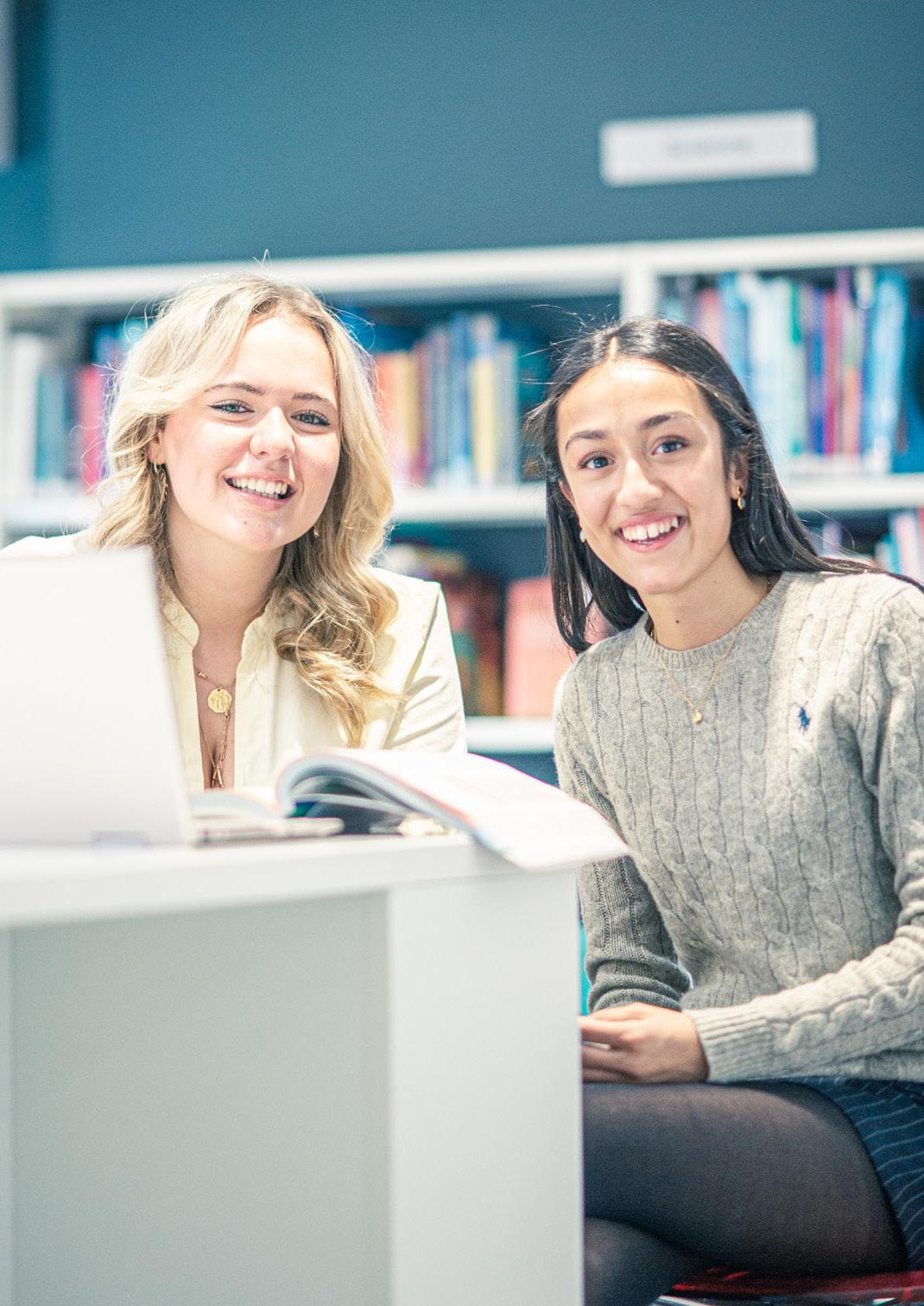

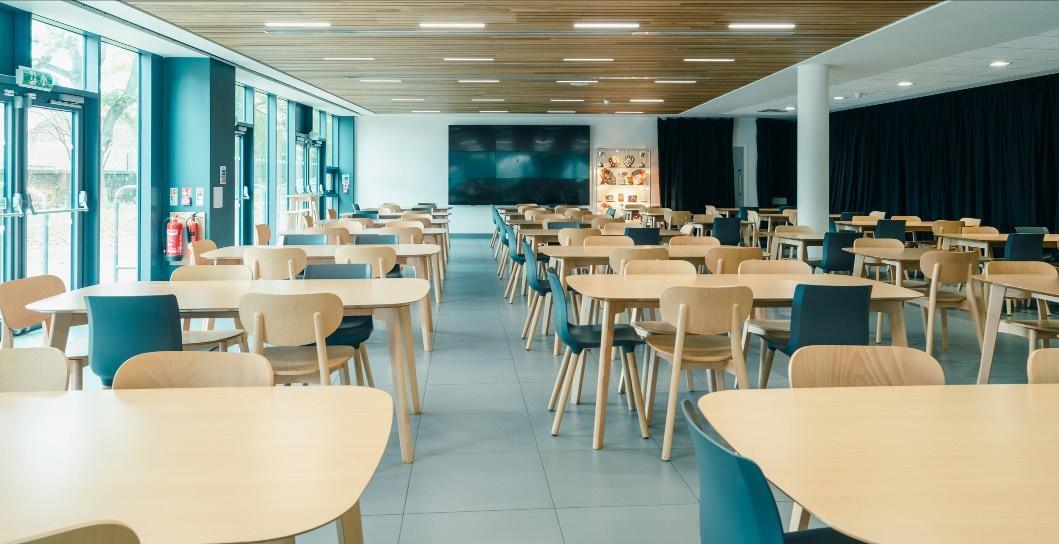

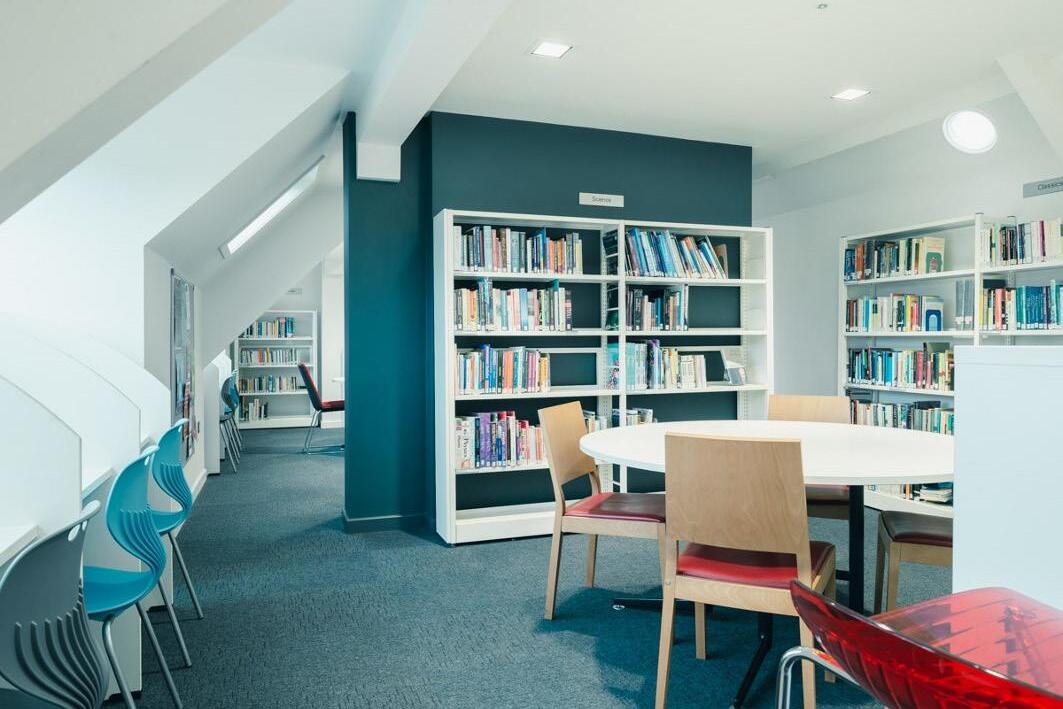
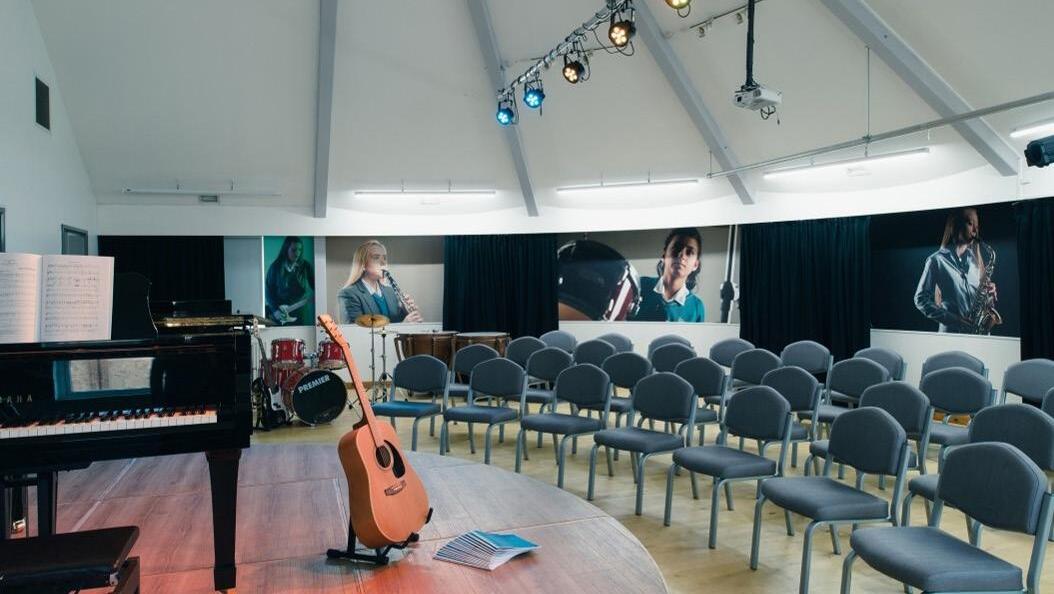


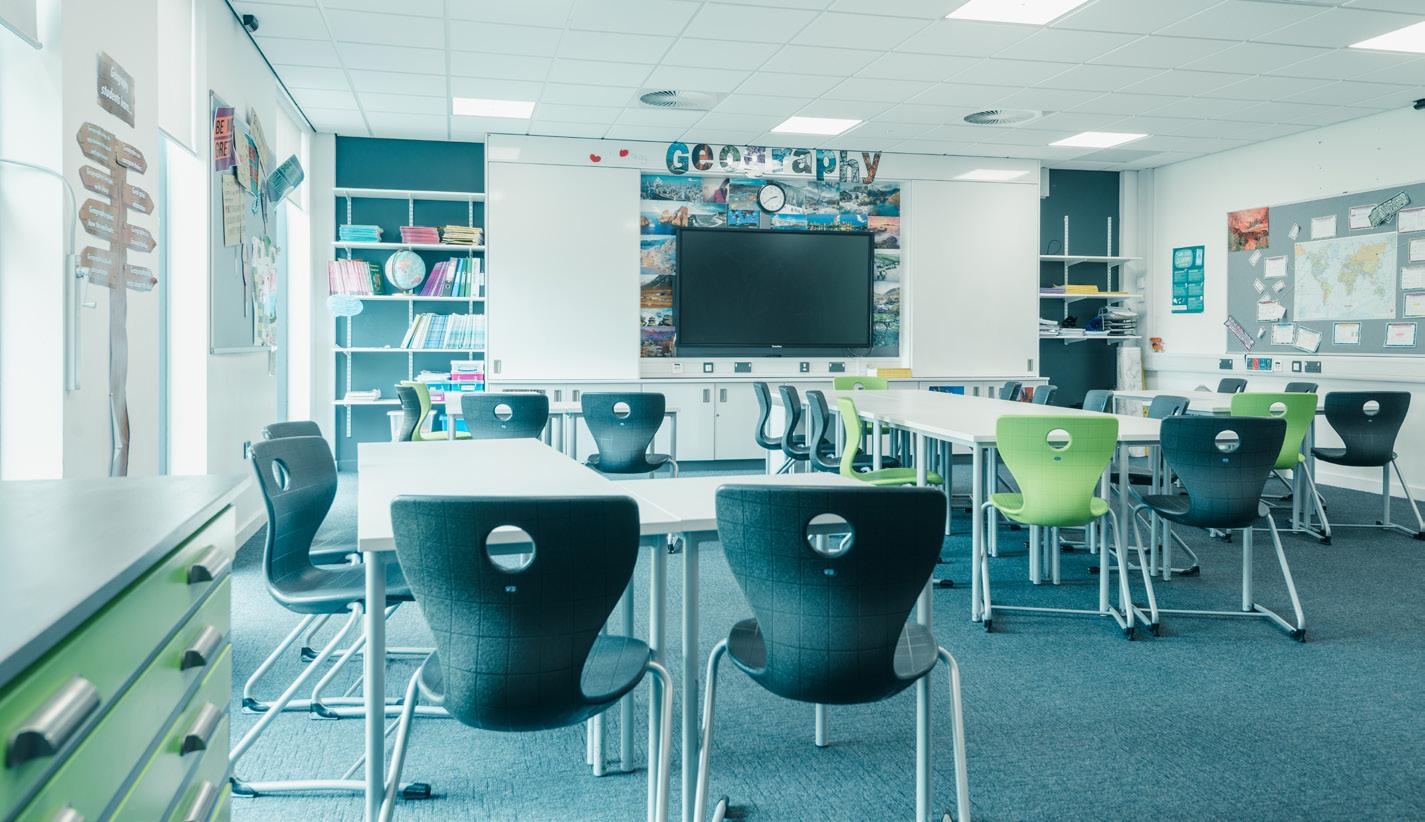


For all enquiries please contact our Admissions Manager on 0191 201 6511 or via email admissions@ncl.gdst.net
Senior School Tankerville Terrace Jesmond
Newcastle upon Tyne NE2 3BA 0191 281 1768
newcastlehigh.gdst.net
